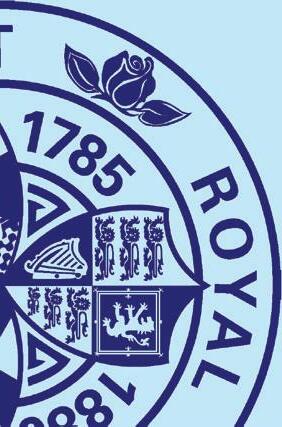PROSPECTUS
Issue #01



























Belfast Royal Academy really is the place where pupils play centre stage. At the 2024 Spring Concert, held in Ulster Hall, over 1000 people gathered to enjoy and appreciate the musical talents of the Academy’s young musicians. Hugo Reilly-Stewart,
pictured above, personified the Academy’s hope for all its pupils when he took centre stage to perform a solo violin piece; in doing so, he wrote his own headline after years of hard work and determination. Holding the audience captive with every note, Hugo,
and all the young people involved, showcased an impressive array of musical talent that left attendees spellbound. Featuring performances from each choral and instrumental group, including the Ben Madigan
Continued on Page 13
This year we present a new take, a new perspective on the traditional prospectus. We hope the headlines contained tell you more about who we are and what Belfast Royal Academy stands for - a school rooted in history but passionate about its future. This is not like any other prospectus. It is written to be read, leafed through and considered. Could it be that you will catch a glimpse of your own child’s potential in one of the headlines? Is there a headline missing and could your child be the one to write it? If those are your thoughts, then Belfast Royal Academy is the place where those hopes can become reality. It is a place where the glimpse of potential gets noticed and where the early talent of a Form 1 pupil finds the right soil in which to grow. We know that those who make headlines on a global stage have had their roots well developed at a young age. Schools who allow that to happen are great places of education and we believe we are that place. A normal prospectus cannot show you what we mean - The Prospectus can. Enjoy reading the new prospectus of Belfast Royal Academy.


When Rev. Dr. James Crombie founded the Academy in 1785, his ambition was to provide an education of a high standard that would be of ‘unspeakable advantage’ not only to Belfast, but to the North of Ireland.
240 years later, Belfast Royal Academy remains one of Northern Ireland’s most successful grammar schools in which intellectual rigour and the pursuit of academic excellence remain constant.
Speaking of her excitement of welcoming new pupils to Belfast Royal Academy, Principal, Mrs Woods, explained how the Academy’s history has shaped it as a school for the future.
“We take great pride in our ethos and values honed
over the centuries, but we are equally proud of the inclusive community that makes the Academy such a unique and special place. Opportunities for learning and broadening horizons outside the classroom are abundant, providing an education that develops the whole person to be the best version of themselves.
Visitors to the Academy often remark on the strong relationships that exist between pupils and staff and we believe that this sense of community, when coupled with high aspirations and respect, is essential to allow pupils to flourish.
Our expectations for every pupil in terms of personal achievement, academic and otherwise, development of character and conduct are very high. We have an excellent pastoral care system that focuses on core
values such as personal responsibility, respecting diversity and having a mind to be kind. Our motto, per vias sapiantae (along the paths of wisdom), reflects the potential that our pupils have to become the future leaders and thinkers who change the world.
Our website and social media pages (Facebook and Instagram) will give you a snapshot of our vibrant and caring school and the wealth of opportunities that are available.
We look forward to welcoming you to our Open Events so that you can immerse yourself in our unique environment and experience for yourself everything that we have to offer.”
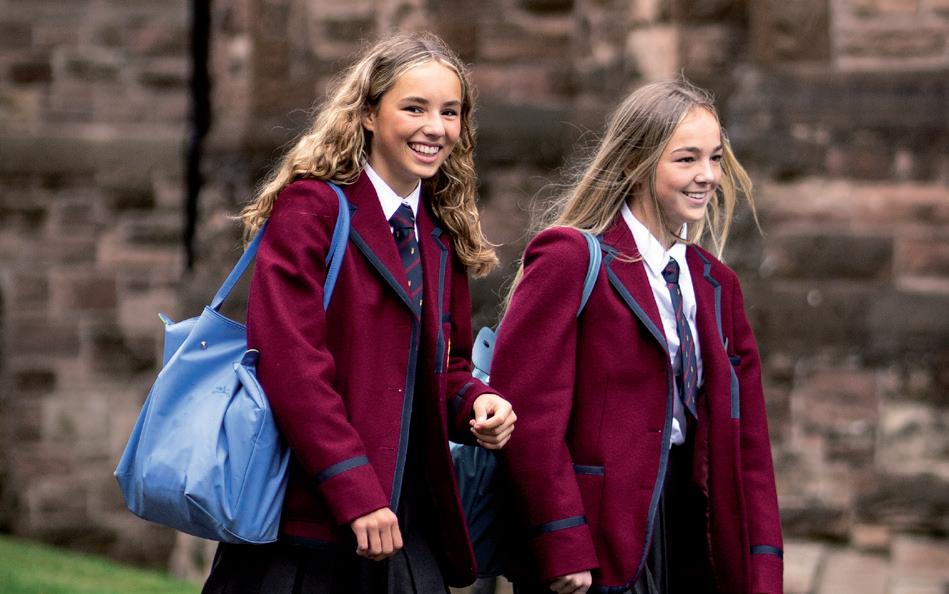
The Academy’s vision, which has evolved over many years, is to ensure that all our pupils are given every opportunity and the support they need to fulfil their potential in school life.
How does your vision become reality through your mission?
By stimulating intellectual curiosity, we create independent thinkers better equipped to contribute to and lead society. By offering every pupil the opportunity to explore a wide range of subjects, challenges and experiences, we help them discover passions, talents and interests that will stay with them for life.
The essence of Belfast Royal Academy is a high standard of teaching coupled with deep levels of support. By nurturing self-confidence and selfworth, we reveal true potential in young people.
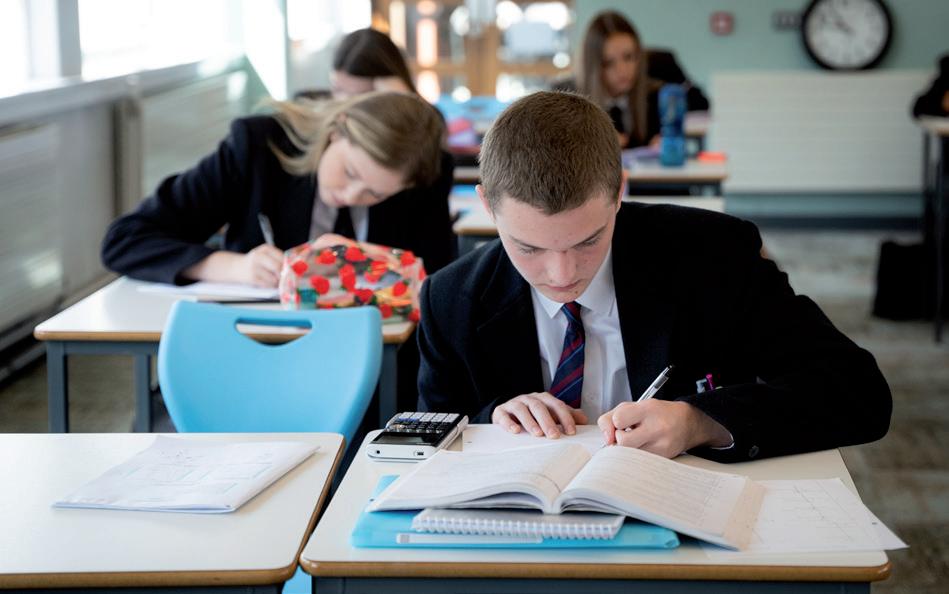
1. We respect knowledge
Academic, practical, artistic or general, we do not just impart knowledge, we teach the value of it as a currency. Pupils are taught by subject specialists and are encouraged to develop a deep love for learning.
2. We champion diversity
We are, historically, an inclusive school. Understanding the nuances of all our differences widens our perspective, enriches our lives and helps us find a deeper appreciation of the wider world.
3. We are not afraid of hard work
We aim high and achieve the results – academically, creatively and in sport. Success requires hard work inside and outside the classroom. We believe that hard work instils an ethic of determination and resilience and develops strength of character.

4. We have high standards
Since the establishment of the Academy in 1785 by Rev. Dr. James Crombie, our school was established to provide “education of a high standard.” This remains our ethos over two centuries later, adding opportunities and experiences to our daily aspiration. Our holistic approach also embraces instilling high standards of behaviour and a culture of integrity and respect - things that make us what we are.
Our Vision, Mission and Values align our identity with our purpose as we serve our pupils, local community in North Belfast and the wider catchment area. Our identity as a diverse, co-educational, nondenominational and high achieving grammar school is not just unique, but something which fills us with tremendous pride.
Choosing a school is one of the most important decisions you will make for your child’s future and we hope our prospectus gives you a sense of the vibrancy, fun and dynamism of the community in BRA. We are proud of the wealth of opportunities we offer and the high standard of pastoral care afforded to each pupil. We would encourage you to visit the Academy and meet staff and current pupils at one of our Open Nights to see first-hand and experience all that Belfast Royal Academy has to offer.
Details of our Admissions Criteria can be found on our website:
Each year we admit 200 pupils into Form 1. Pupils are admitted according to our Admissions Criteria and the application process is administered by the Transfer Office at the Education Authority. Our Admissions Criteria for entry into Form 1 is renewed annually by our Board of Governors and is uploaded on our website.
Occasionally a small number of places may become available in these year groups, depending on enrolment numbers at the start of the academic year. Details of our Admissions Criteria for entry can be viewed on our website. Applicants should submit the online application form and they will then be notified of the date of the Assessment Day.
Being part of our Sixth Form is both a challenging and rewarding experience and we welcome talented and capable pupils into the Academy to complete the final stage of their schooling. At BRA we create an environment in which our pupils achieve excellent examination results whilst also developing their personal and leadership skills. It is important to make contact with us as soon as the GCSE results are published since there are a limited number of places available.
Pupils wishing to join our Sixth Form will normally require a minimum of 12 points at GCSE (A* = 4 points, A = 3 points, B = 2 points, C* = 1.5 points, C = 1 point) and are expected to have achieved a Grade A or Grade B in the subject being taken at A-Level depending on the subject. Entry to Sixth Form is also dependent upon a pupil’s disciplinary record and school attendance.

Three Form 1 pupils at Belfast Royal Academy, half way through their first year, agreed that there was no need to be worried or anxious about coming to BRA. Amelie Chada, Sylvie Campbell and Timothy Lee took time out of their Biology class to speak about what it was like to move from their primary school to “Big School”.
Why did you choose BRA?
Timothy: BRA had a really good reputation and I liked that.
How did you feel when you got your SEAG results?
Amelie: I felt really proud and to be honest very relieved!
When did you get your uniform?
Sylvie: It was quite close to my first day – I had some uniform from my sisters so this was easy.
How did you feel the night before your first day?
Amelie: I was a bit nervous but I was really excited at the same time.
Sylvie: I was nervous. Nobody from my class were going here and I was worried that I wouldn’t make new friends.
What was your first day like?
Timothy: We had a great day! It was all team building and getting to know people quickly. We also had a quiz and it was brilliant in helping me meet new friends. The people I met on the first day are still my friends now.
Amelie: On the team building day there were lots of tasks which really helped us get to know each other especially those of us in the same tutorial group.
What was your first proper day like?
Timothy: We got our timetables on the first full school day and it was good to start getting to know our way around. I was told it would be no time before I wouldn’t even see the buildings - I didn’t
believe them – after 1 week, I knew exactly what they meant.
Amelie: Getting my timetable was really exciting and really useful. The rooms are named after the buildings they are in so it’s easier than you think to find your way around.
Sylvie: The tour was really good and the Senior Pupils were really helpful. They formed a big double line and clapped us in as we walked in. That was brilliant.
You now do 14 subjects – how has that been?
Amelie: At primary school I only learnt Maths, English, PDMU and The World Around Us, so coming here was fantastic. We get to do French and Home Economics and French is my favourite subject – my teacher is so nice.
Sylvie: When I first arrived all my subjects were new and I didn’t understand anything at all – it’s like the information went in one ear and out the other! After a while, however, I got used to it and it’s been ok since. At primary school, we were taught how to use a homework diary before coming here and that really helped.
Timothy: We didn’t do too many other subjects at primary school. I think Covid was to blame! Since I’ve come here, I’ve really enjoyed all the new subjects. I really like Maths because I’m good at it.
What has been your best day so far?
Timothy: The first day we did PE! Getting the bus to Roughfort.
Sylvie: I like hockey and after games, I stay to play hockey for Owls so I have time in-between when I eat a Pot Noodle. It’s just fun having time to relax and take time out before starting to play hockey again.
Amelie: The first day was a really good day – a lot of fun.
The December exams are coming up – how have you been preparing?
Timothy: Flash cards have worked really well and I
use those a lot.
Amelie: We’ve been taught really well how to learn, I use flash cards and mind maps but I find the flash cards better to use.
Sylvie: I’m a bit nervous but all the teachers have been helping us revise and that has been really useful.
Are you involved in any Extra-Curricular activities or clubs?
Amelie: There are so many clubs and societies here. I play netball even though I hadn’t played that before. I also go to guitar lessons once a week.
Timothy: I go to swimming and rugby and I also go to Comic Book Club, Board Game Club, Coding Club, Young Einstein and I’ve been to Inktober. I love getting involved!
Sylvie: I didn’t know what I wanted to go to but I now go to hockey and since I was the only one of my friends who wanted to go to SU, I asked them to go so now we all go there on a Wednesday at lunch time and it is really good fun.
What advice would you give to P6 or P7 pupils about picking a school?
Amelie, Sylvie and Timothy all agreed: Go to the Open Nights and speak to the teachers to see if they are nice.
Be careful with friends. Fake friends are best moved on from and just take each day as it comes.
Our parents listened to the Principal’s talk and they really liked Mrs Woods’ talk.
Lots of people are scared about having no friends but there is no need to worry; making new friends is easy because there are so many clubs to go to and you make friends there really easily.
Thank you Amelie, Sylvie and Timothy for being so helpful.
Our daughter has wanted to go to BRA since nursery school. We found the pastoral care to be very good for our older daughter when she attended. The community and a sense of belonging which BRA creates amongst the pupils, was really important to our daughter. BRA has strong individual Science subjects taught from Form 1 as well as Classics alongside Modern Languages. It has a robust Maths and English syllabi which were important to us.
School values, pupils were welcoming, knowledgeable, well spoken, the impression of the school and teachers on the Open Days confirmed what the school values stood for. Also, school prestige and recommendations amongst friends whose children attend/attended. A “good feeling”, convenient location and extensive extra-curricular activities available.
...the great reputation the Academy has and how good the students grades are when they complete exams. It is a very well run grammar school.
It has an excellent reputation for supporting young children from all walks of life. My brother attended the school many years ago and believes he had an excellent educational journey. I believe that BRA will provide a space where my son will experience a positive education and will be supported through his personal development into young adulthood.
I attended BRA and always hoped my daughter would attend as I had a great experience - I am still associated with Academy RFC. It was her decision, however, and the Open Day was the best one we attended. She picked BRA as her first choice despite most of her peer group going elsewhere.
Belfast Royal Academy was our first choice and we were delighted to have received a place for our daughter. She has settled very well and made friends already and we are confident she will have 7 great years.
...I liked the friendly, inclusive atmosphere...
We live in the country near Ballymena but work in Belfast. My husband and I heard colleagues talk of the school fondly many years after attending. We never felt that way about our school days. This made us curious so we went to one of the presentations with our eldest when she was P6. No other talk compared. We attended again in P7 and felt the same. The school ethos, teacher/ pupil relationships, balance between hard work and a sense of fun is what makes BRA unique. I’ve no regrets by-passing more local schools and having to put in the extra effort getting my children to and from school and all the extra-curricular activies over the years as I think the school has prepared them well for life beyond. We’ve just come home from Prize Day and I’ve seen the kids leaving inspired. I just love it!
...great academic success with many transport links...
We chose Belfast Royal Academy as it has a great academic record but more importantly it is a very diverse school with a mixture of gender and religions - it had a very inclusive feel that our daughter and us felt suited her best out of all the schools.
It has an excellent reputation for supporting young children from all walks of life.
I have two other older children currently at Belfast Royal Academy so this is one of the main reasons why I chose to send my youngest child. All are happy there and doing well academically and socially.
There are a large selection of GSCEs and A-Levels
We would pass the school each morning on our way to my son’s primary school. He always said one day ‘he would go to the castle’ - a simple comment which became a goal. We visited the Open Day in P6 and P7 and it was always his top choice as well as mine as a parent. Firstly, we noted the warmth from the pupils, everyone greeted us and seemed happy and confident as BRA pupils. The teachers we interacted with were approachable and down to earth. We also loved the range of subjects and facilities. My son was drawn in by it being heavy on sports although he really wishes football was introduced in Form 1, as outside of school it is a huge part of his life. We were impressed by pupil GCSE and A-Level results and by the time it came to him going to BRA, it already felt familiar and somewhere he would easily slot into. Thankfully he has.
The sporting facilities are an added bonus with many opportunities to join in, no matter what level.
It was hugely important that the Academy was inclusive of all and progressive whilst retaining cultural aspects from its history. I think the parents’ events were personable even with the numbers in attendance and this reflected well. To be honest, BRA’s reputation was very influential to us. On a personal level, when looking at the school history and prospectus, it reminded me of my time at school and the fantastic, disciplined and professional education I got. I really wanted that for my daughter and was overjoyed when it was confirmed she got in.
of education
...higher educational standards

Our son had been a pupil of the Academy for 5 years and has had a very positive experience so far. As parents we have also been very pleased with the school and have been impressed with how certain matters have been handled. The ethos and strong leadership qualities of Mrs Woods were also factors in our choice, as were the polite, respectful pupils at the four Open Nights we attended over the years. We also chose BRA over other local schools as it is co-ed.
All my family have attended BRA and loved it. It has an amazing reputation for producing very kind and respectful young people.
It was ultimately her choice, and after we visited a few schools on their Open Nights, it was BRA that impressed her the most. However, I should also say that both parents are past pupils and we have very fond memories of BRA, not to mention having received a wonderful education, so this no doubt informed her choice too. The wide catchment and diversity within the school were very positive factors too. The extra curricular offerings are excellent, and even though she is only in her first term, she already feels part of the school community attending the Music Department and after school Art Club.
My name is Megan and last year I entered the Queen’s College Oxford’s annual Anthea Bell Translation Prize, not expecting anything to come of it. A few months later I was shocked to find out that I was not only the Northern Ireland winner but also the UK wide winner for German in my category. For the competition I was tasked with translating a passage from Imgard Kuen’s ‘Nach Mitternacht’ or ‘After Midnight’ in English. The book was banned by the Nazis as Keun wrote it while in exile from Nazi Germany. I found the task challenging but really enjoyable as translating prose was something I had never done before. I have always loved language learning, especially being able to practise speaking with native speakers. Off the back of the competition and thoroughly enjoying A-Level German, it only made sense that I would go to Germany to practise my German over the summer.
Instead of taking a normal holiday, I decided to go to Dr Bell and ask him if I could go to Germany in June when my exams had finished. Luckily for me he agreed, and I signed up for the platform WWOOF which stands for Worldwide Organisation of Organic
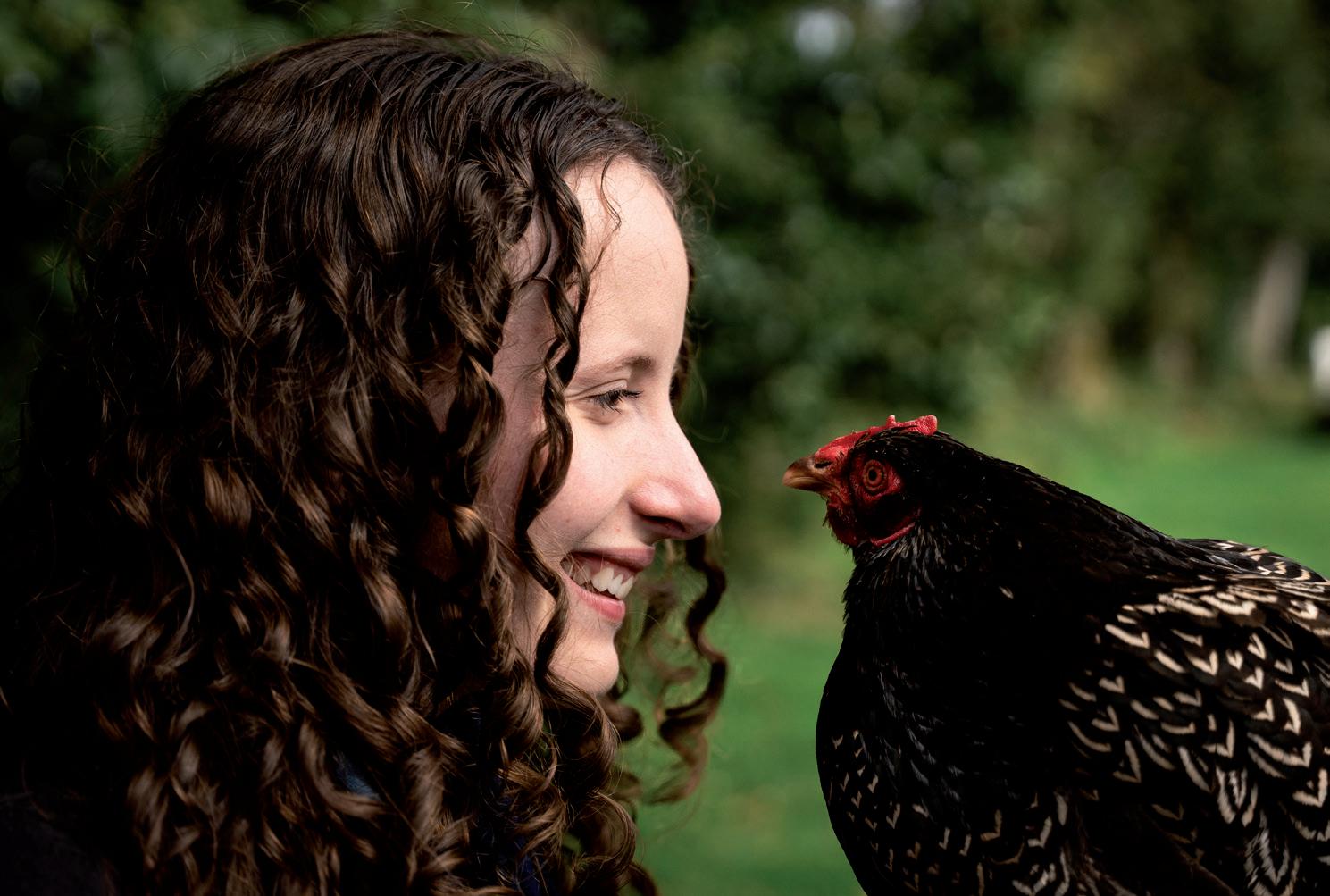
Farms. Through this organisation, I began to apply to volunteer to work in German farms.
A few months later in June, I found myself standing in the arrivals terminal at Stuttgart airport while Germany was in full Euros swing. Little did I know that from that point, not only would I speak almost exclusively German for the next 4 weeks, but I would also have the most amazing experiences making friends for life.
On the farm I collected eggs everyday from their 600 strong flock. Whenever the end of June rolled around I also picked raspberries daily as raspberry season began. Between farm work and living with the family on the farm I began to expand my German skills rapidly, and make the best memories.

the ‘Hoffest’ or farm festival where over the course of a weekend hundreds of people visited the farm for music performances, stalls, food stands, wagon rides and games. The entire time I felt so welcomed by their community and hospitality. I also loved looking after the animals, the pigs - Ellie and Edgar, the Turkeys - Garfield and Coco, the horses and the goats. Another highlight for me was when 400 goslings arrived at the farm and I got to help immunise them. They were the cutest balls of fluff, but my word did they poo everywhere!
My favourite days on the farm were definitely during
Farm life wasn’t always glamorous, but I am so incredibly happy I got the opportunity to do something like this and am already planning my next trip back! The best part of doing this through WWOOF is that all I paid was the membership fee and my flights. While on the farm I was provided bed and board in return for my work. I only had to work a few hours each day but most of the time I chose to work from 7am until 5pm because I enjoyed it so much!
BRA was so proud of one of its talented L6 pupils, Aaron Carter, who won 1st place in the INTO Film competition for his 3D animation film, “Keys”.
Aaron’s film emphasises the importance of relationships and family in our lives and also highlights the role that music has in bringing people together in difficult times. Aaron completed this film on a standard home computer during his spare time whilst completing his GCSEs. Unsurprisingly, Aaron decided to take up Moving Image Arts for A-Level.
To watch “Keys”, scan the QR code opposite with your phone, and enjoy 2 minutes of emotive animation.


Belfast Royal Academy is only two steps away for its pupils, ensuring that no matter where they come from - be it Lisburn, Bangor or Larne - getting to school is a seamless experience. With a robust transportation network that includes dedicated shuttle buses, the Academy is closer than ever for pupils across Greater Belfast.
The BRA shuttle buses operate regularly to and from the Yorkgate Station, providing a simple link for pupils travelling by public transport. “We understand how important it is for our pupils to have reliable transportation options,” said Vice Principal, Mr Hughes. “Our shuttle service is designed to make the journey to BRA as easy and stress-free as possible.”
In addition to the main shuttle service, special buses cater to the needs of pupils from West Belfast, Jordanstown, and Glengormley, meaning that the Academy is easy to reach. The majority of pupils make use of the train and bus services, stepping off close to home and transferring to the waiting BRA bus at Yorkgate.
For those involved in extra-curricular sports, the Academy arranges transportation to and from the pitches, taking pupils back to either BRA or Yorkgate Station after practices and matches at Roughfort. This ensures that our pupils can participate in a range of activities without the added worry of transportation.
As Belfast Royal Academy continues to provide comprehensive transportation options, it is always ready to deepen the Academy’s commitment to accessibility and support for its pupils. “We want every child to feel that BRA is within reach, no matter where they live,” added Mr Hughes.
The message is that BRA is only two steps away.


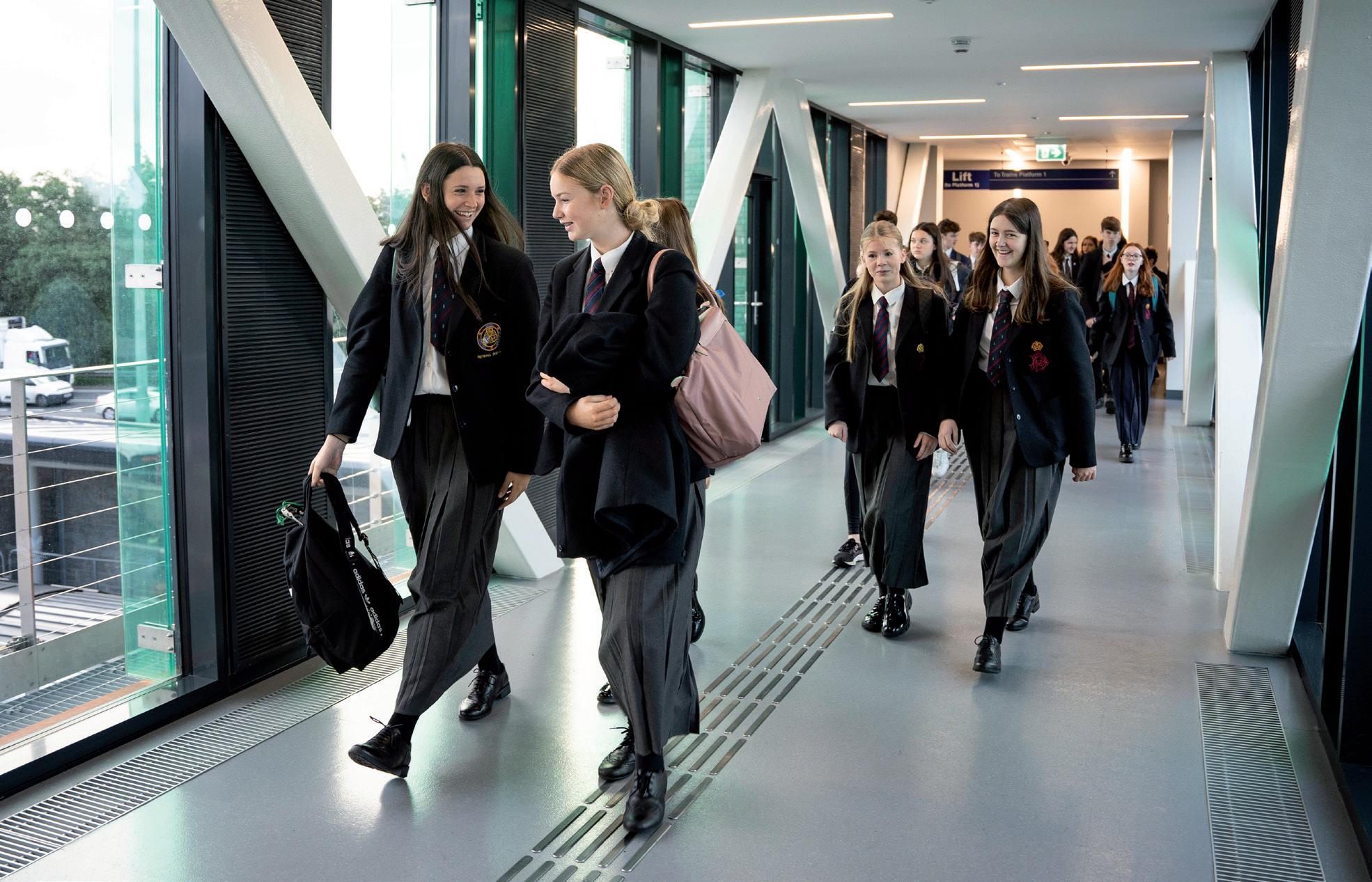
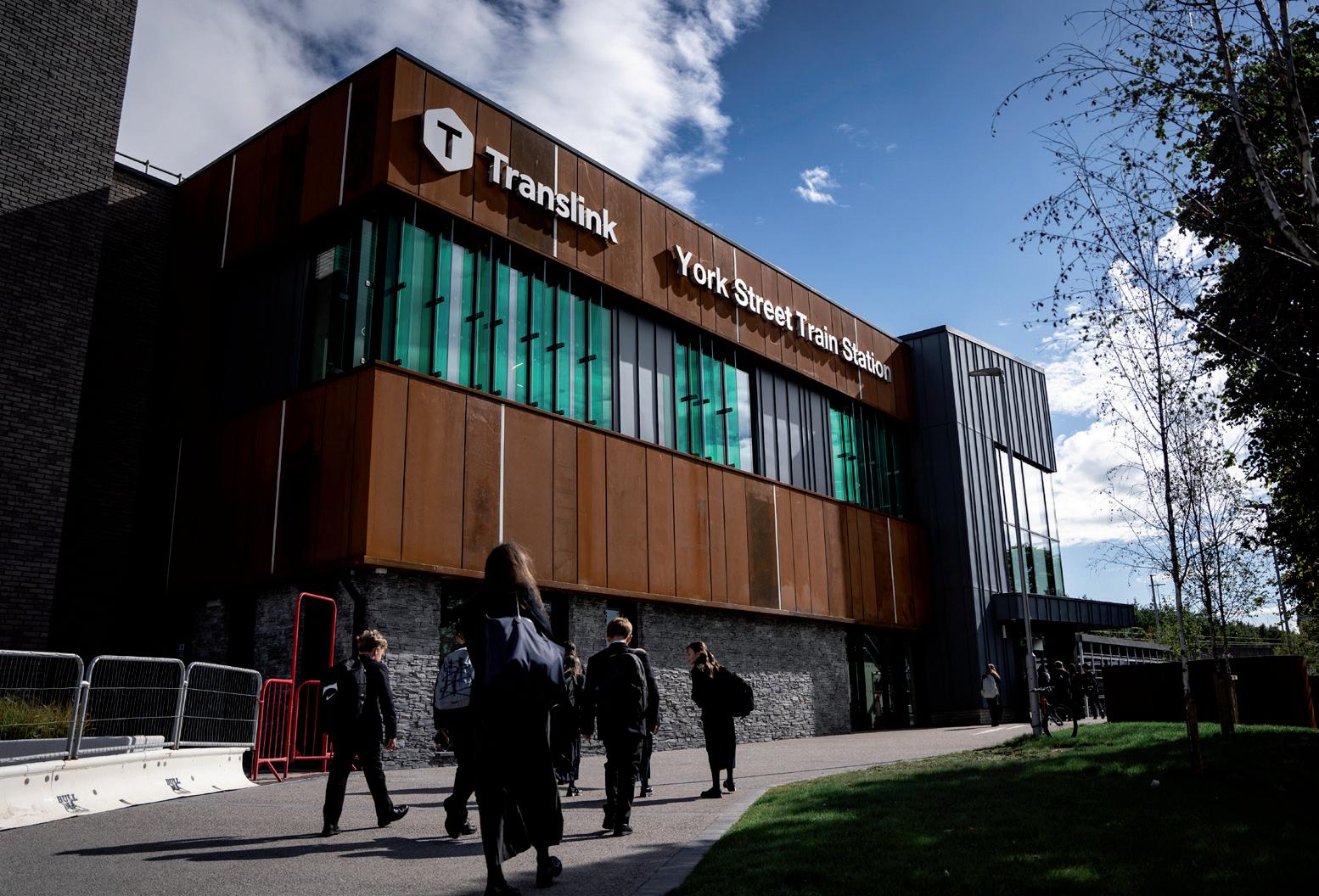

Belfast Royal Academy aims to give its pupils a broad, balanced and relevant education. In the Junior School we seek to give equal opportunities to all pupils and the emphasis is on discovery and enjoyment. In these early years, we seek to instil in pupils good study skills and habits which will equip them for GCSE level and beyond. It is the Academy’s aim that the timetable should be constructed to meet the needs of its pupils. To that end, as much freedom of choice as possible is offered to pupils at KS3, GCSE, AS and A2-Level. We endeavour to continually evaluate the curriculum, introducing new subjects that, in our view, serve the needs and aspirations of our pupils.
Key Stage 3 Curriculum
Pupils in Key Stage 3 (Forms 1-3) follow a broad common curriculum, developing knowledge and skill across a wide range of subjects.
In Forms 1 and 2 classes are not streamed. Pupils are divided into seven classes and are taught in this arrangement for non-practical subjects. The practical subjects, Art and Design, Home Economics, Computer Science, Music, Science and Technology and Design, are taught in smaller groups.
During all Key Stage 3 years, the three Science subjects, Biology, Chemistry and Physics, are taught separately, each for two sixty minute periods per fortnight.
In Form 3 pupils are partially streamed in Mathematics, but all other classes remain mixed. Pupils choose to study three subjects from the following choice of eight: Business Studies, Computer Science, Drama, German, Home Economics, Latin, Spanish and Technology. Each of these option subjects are studied for three periods per fortnight.
During all Key Stage 3 years, pupils follow a course in Learning for Life and Work which involves the three strands: Personal Development, Citizenship and Employability. In Form 3 pupils have one dedicated Careers period per fortnight. RSE is delivered in line with statutory guidance and makes use of CCEA resources. Pupils in Form 1 have one LORIC period per fortnight which is our programme for developing character and soft skills.

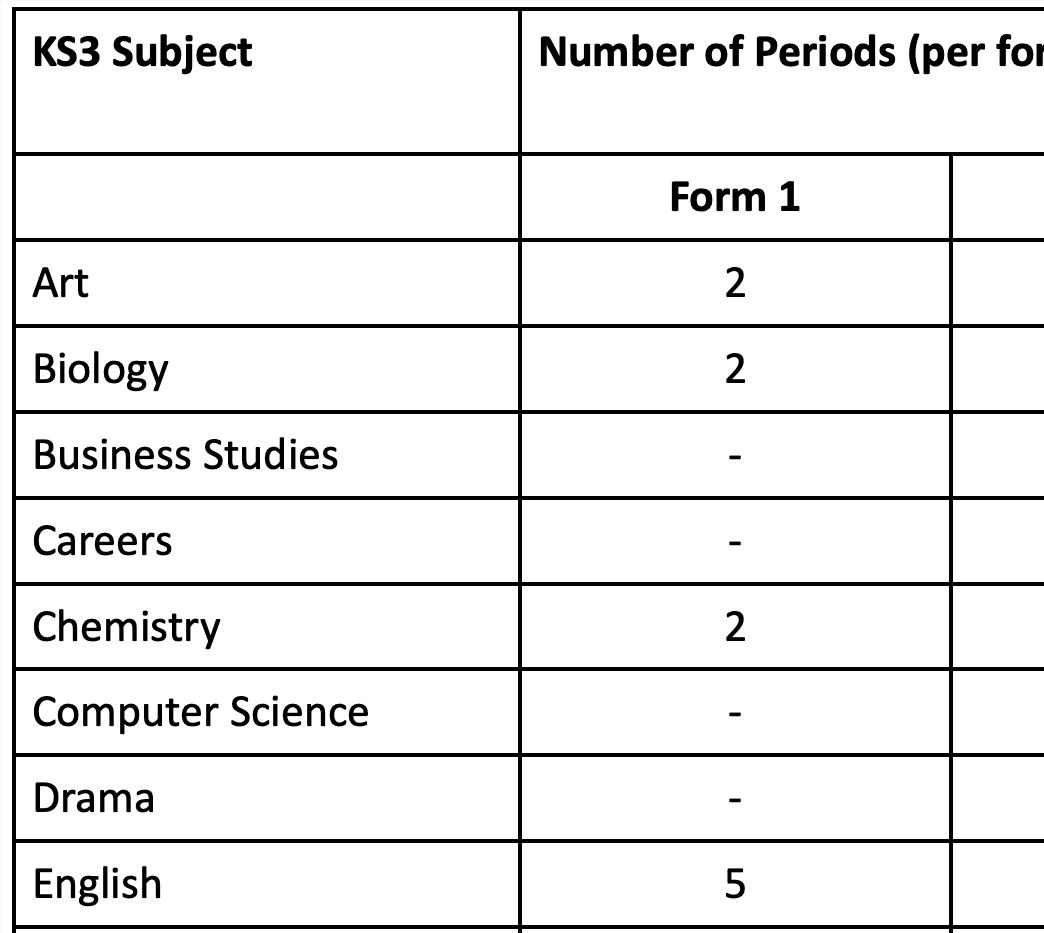
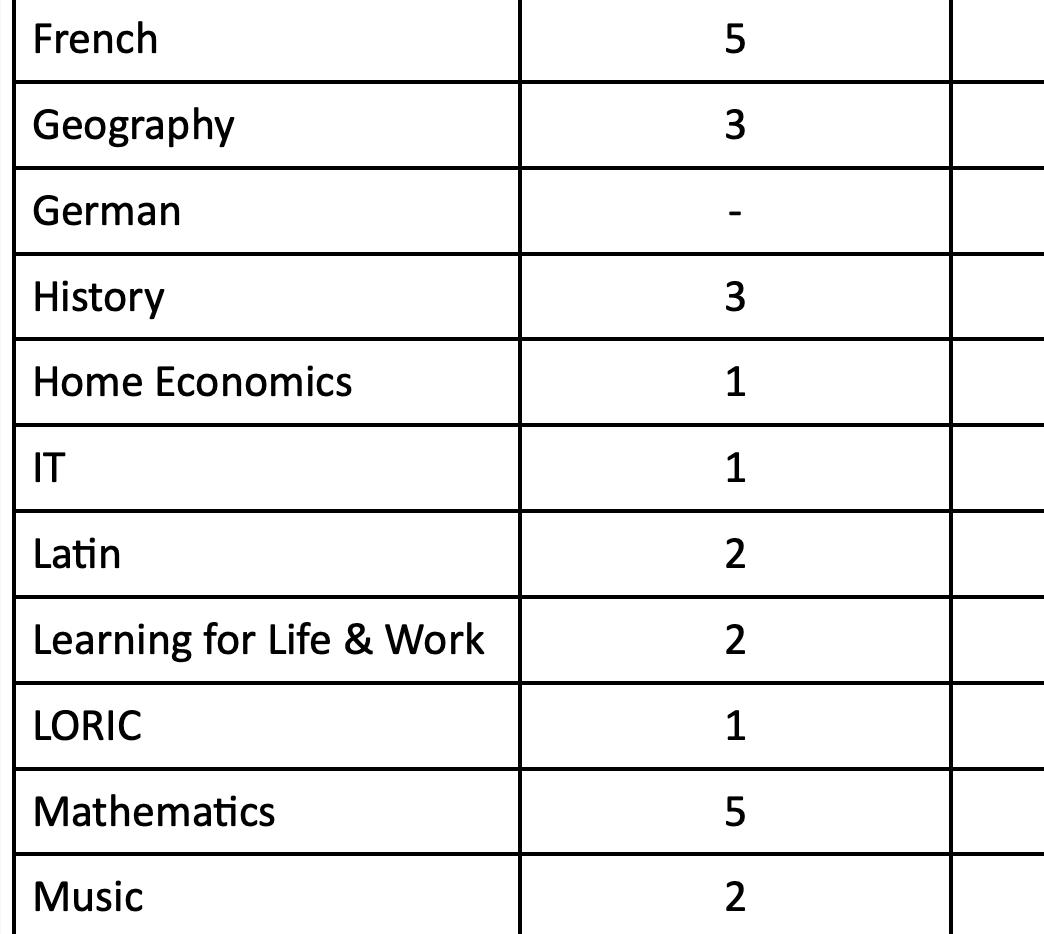
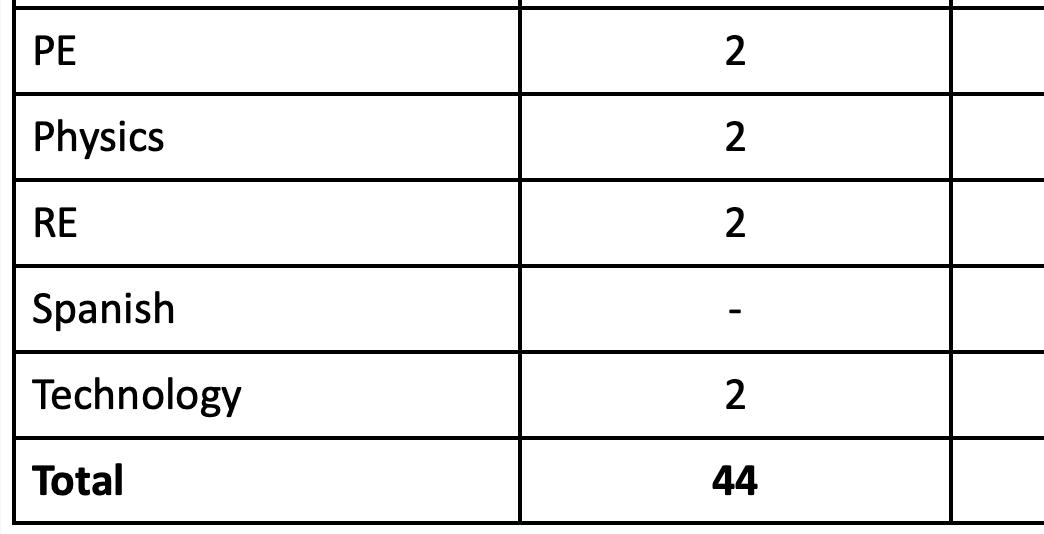

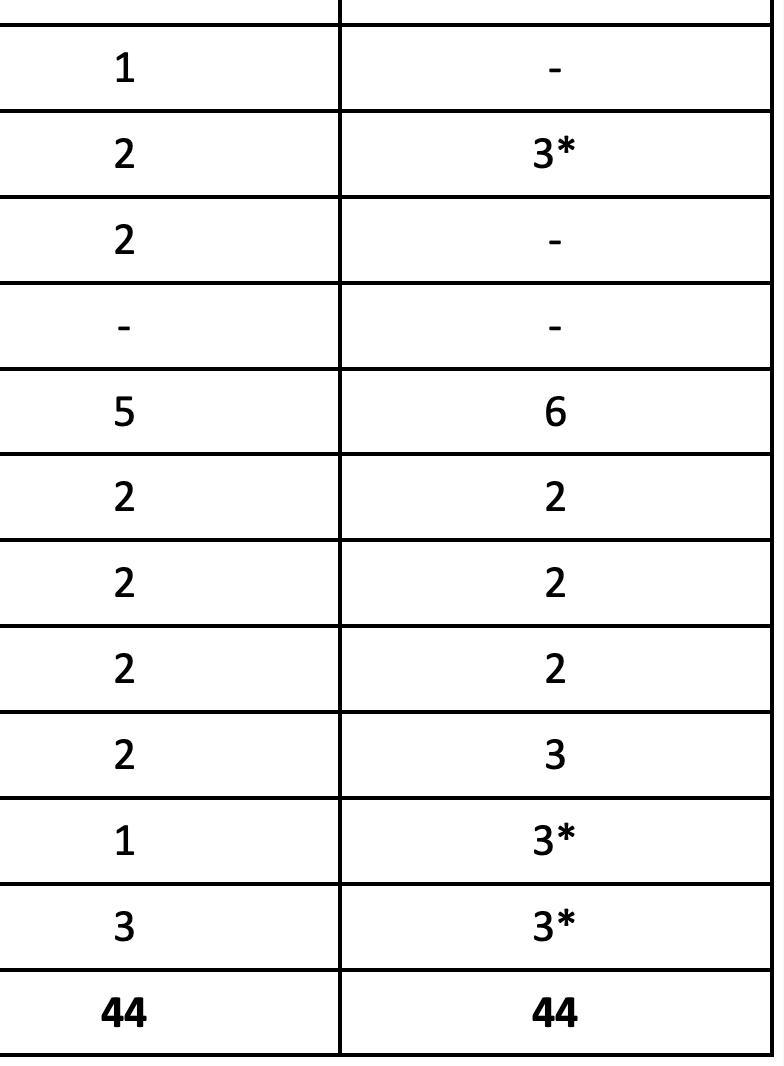
All pupils have 4 periods of games per fortnight and a tutorial period once a week. *Option subject, 3 periods per fortnight.
Pupils in Key Stage 4 (Forms 4 and 5) follow a common core curriculum and then choose from a range of subject options. Pupils take a minimum of 8 and a maximum of 10 subjects at GCSE. Option block subjects are studied for five periods per fortnight. All pupils take GCSEs in English, Mathematics and Religious Studies. Approximately 85% of pupils take English Literature and approximately 30% take Further Mathematics.
Most pupils take at least one Science subject at Triple Award standard. A small number of pupils follow a Single Award Science option.
All pupils study at least one modern or classical language chosen from: French, German, Latin and Spanish.
In addition, pupils have three other GCSE choices.
Non-GCSE subjects taken by all pupils are PE and Games (Form 4) and Games (Form 5), and LLW, which includes the three strands: Personal Development, Citizenship and Employability. Pupils in Form 5 have a dedicated Careers period, and a dedicated Study Skills period. RSE is delivered in line with statutory guidance and makes use of CCEA resources.
The table opposite gives the full list of the twenty-five subjects typically offered at GCSE.
All pupils in Lower Sixth study three or four subjects to AS-Level and most continue with three subjects in Middle Sixth to the full A-Level qualification. A number of pupils continue with four subjects to A2Level. About 15 pupils complete their A-Level Mathematics in one year, and a small number of these pupils may complete five A-Levels by the end of the Sixth Form. In their Lower Sixth Year, pupils have the option of some enrichment courses including choir and work experience in local primary schools. In addition, all pupils have a tutorial period once each week which includes elements of Religious Education and UCAS preparation as well as a devoted programme for our Oxbridge candidates.
Games are optional for pupils in the Sixth Form. Pupils who do not participate in games have a Study period instead.
The table opposite gives the full list of the twenty-nine subjects currently offered at AS and A2.
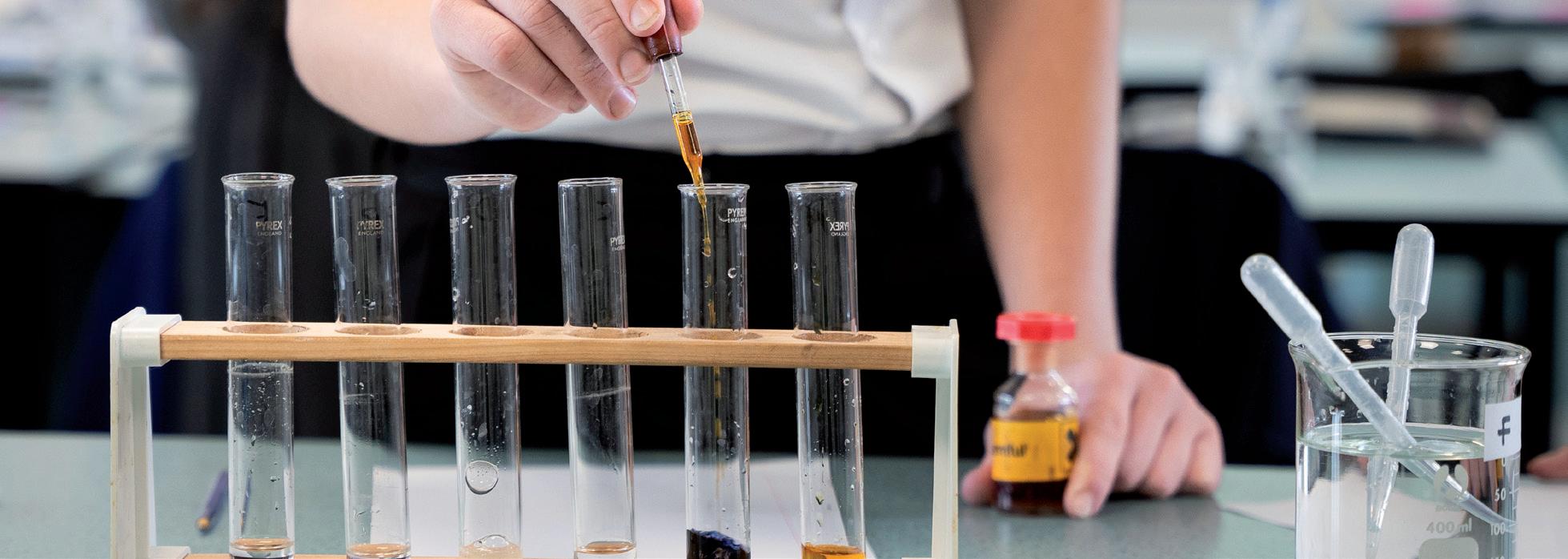
(25 subjects on offer)
Subject Title (Awarding Body)
Art and Design (CCEA)
Biology (CCEA)
Business Studies (CCEA)
Chemistry (CCEA)
Computer Science (OCR)
Design and Technology (CCEA)
Digital Technology (CCEA)
Drama (CCEA)
Economics (CCEA)
English Language (CCEA)
English Literature (CCEA)
Food and Nutrition (CCEA)
(29 subjects on offer)
Subject Title (Awarding Body)
Art and Design (CCEA)
Biology (CCEA)
Business Studies (CCEA)
Chemistry (CCEA)
Digital Technology (CCEA)
Drama and Theatre Studies (AQA)
Economics (WJEC)
English Language (AQA)
English Literature (CCEA)
French (CCEA)
Further Mathematics (CCEA)
Geography (CCEA)
German (CCEA)
Government and Politics (CCEA)
Health and Social Care (CCEA)
Subject Title (Awarding Body)
French (CCEA)
Further Mathematics (CCEA)
Geography (CCEA)
German (CCEA)
History (CCEA)
Latin (OCR)
Mathematics (CCEA)
Music (CCEA)
Physical Education (CCEA)
Physics (CCEA)
Religious Education (CCEA)
Single Award Science (CCEA)
Spanish (CCEA)
Subject Title (Awarding Body)
History (CCEA)
Latin (OCR)
Mathematics (CCEA)
Moving Image Arts (CCEA)
Music (CCEA)
Nutrition and Food Science (CCEA)
Physical Education (Pearson)
Physics (CCEA)
Psychology (WJEC)
Religious Studies (CCEA)
Sociology (WJEC)
Software Systems Development (CCEA)
Spanish (CCEA)
Technology and Design (CCEA)
Our day begins officially at 8:40am. However, the majority of pupils and staff arrive in school before this time.
Pupils go promptly to Registration for 8:40am and the Official Roll is taken at 8:45am.
With the exception of Tuesday, each period is of one-hour duration.
School finishes at 3:10pm on all days
except Tuesday, when it finishes at the earlier time of 2:15pm, to facilitate staff training and other school based activities.


MONDAY / WEDNESDAY / THURSDAY / FRIDAY
08:40
08:45
08:55 - 10:00
10:00 - 11:05
11:05 - 11:20
11:20 - 12:25
12:25 - 01:05
01:05 - 02:05
02:05 - 03:10
REGISTRATION
OFFICIAL ROLL TAKEN
PERIOD 1
PERIOD 2 BREAK
PERIOD 3 LUNCH
PERIOD 4
PERIOD 5
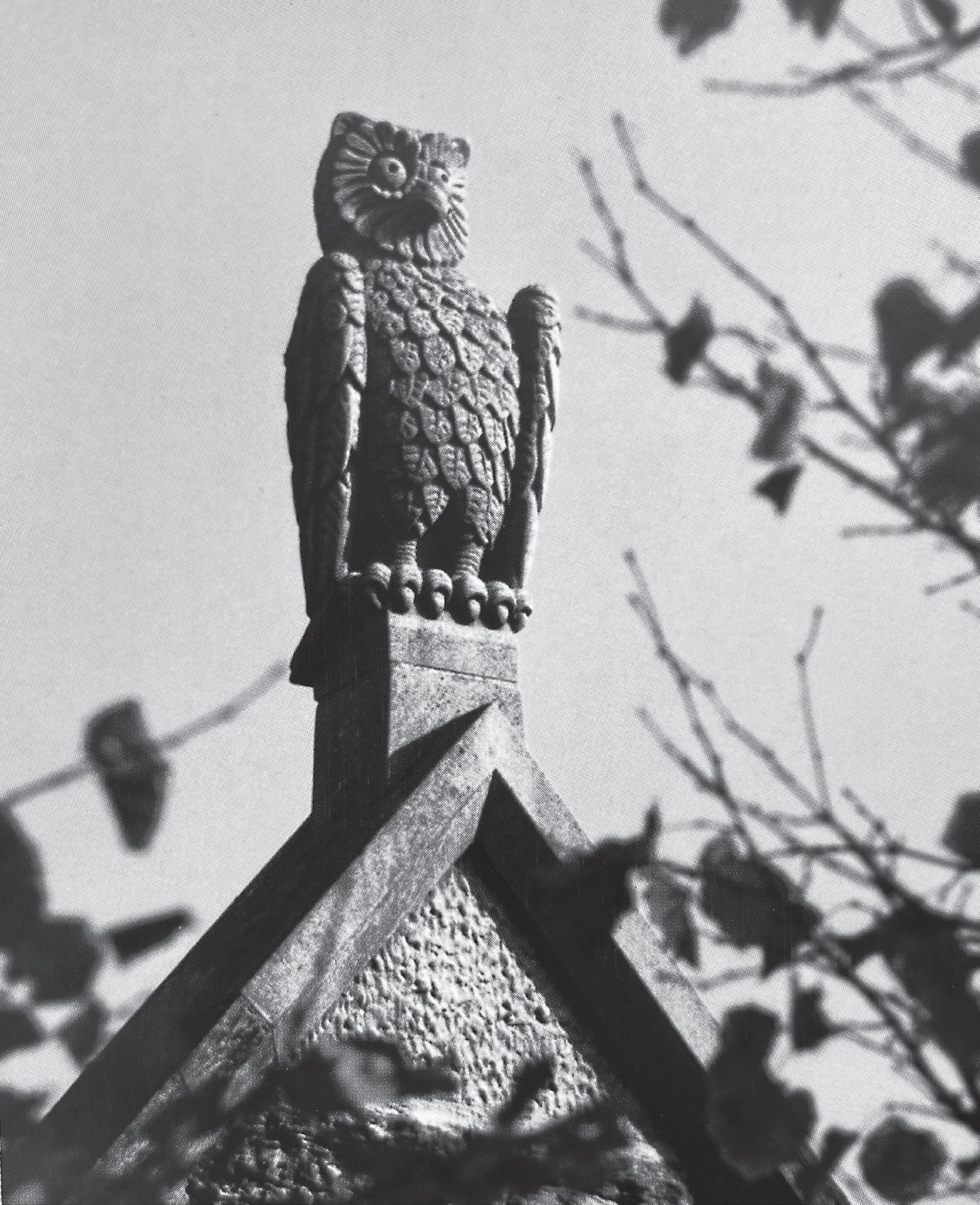
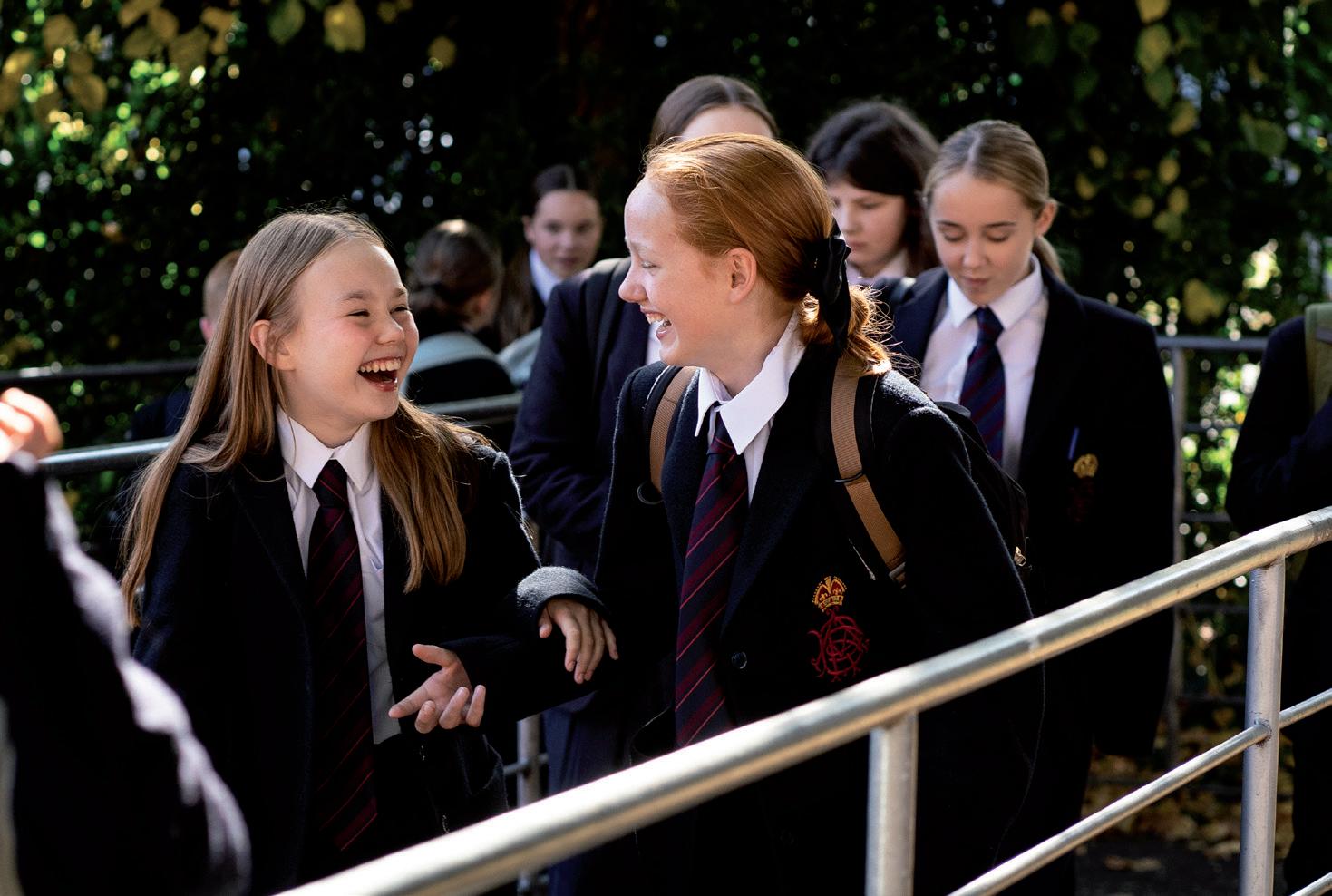
TUESDAY
08:40 - 09:10
09:10 - 09:40
09:40 - 10:35
10:35 - 10:50
10:50 - 11:45
11:45 - 12:40
12:40 - 01:20
01:20 - 02:15
REGISTRATION A / ASSEMBLY
REGISTRATION B / ASSEMBLY (PERIOD 1)
PERIOD 2
BREAK
PERIOD 3
PERIOD 4
LUNCH
PERIOD 5
02:15 - 03:30 STAFF TRAINING / ACTIVITIES
Perched high on the Crombie building sit Knowledge and Understanding, the two owls of Belfast Royal Academy who have been watching over BRA since 1880. Remarkably, while most of the area around BRA was destroyed or severely damaged during the Belfast Blitz in 1941 and despite 700 windows having to be replaced in the Crombie, the Owls emerged unscathed. They are quite shy and go largely unnoticed by most people who pass below them, but they have always played a large part in our school and ethos, standing tall as symbols of wisdom and learning. Knowledge and Understanding remind us that wisdom is the foundation of protected lives where good judgement and
actions result in fulfilment and joy, making it a treasure far greater than gold. Wisdom is gained from deeper learning, from skill, from knowledge and understanding, from rounded individuals who choose to stand for truth and who walk a path that is carved through a strong moral foundation. Knowledge and Understanding have silently watched as over 100,000 pupils have walked the corridors and halls below them. As these pupils have graduated, taking the first steps into their new futures, they emerge as grounded in an ethos we take pride in as our school motto – an ethos that is more than a fleeting phrase, but a life-long journey; “per vias sapientiae”, along the paths of wisdom.

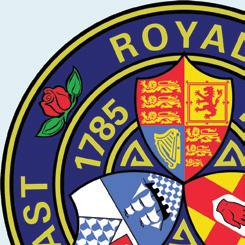



















Continued from Page 1 choir, junior and senior traditional groups and wind band, the event served as a testament to the Academy’s commitment to fostering creativity and excellence in the arts. This year’s concert not only highlighted individual skills but also emphasised the power of collaboration in musical expression.



Held in the Ulster Hall, the concert drew a large audience from parents and the wider BRA community who filled the seats to witness the culmination of months of hard work and dedication. The diverse programme included a mix of classical pieces, contemporary compositions, and traditional folk music, allowing pupils from various year groups to shine.
















The evening opened with a spirited performance by the school’s string orchestra, led by the Director of Music, Mrs Mary McMullan. “The pupils have put in an incredible amount of effort to prepare for this concert,” said Mrs McMullan. “Their passion for music truly comes through in their performances, and it’s a joy to witness their growth as musicians.”

Among the standout performances was that of the orchestra who set the scene with a toe-tapping rendition of “Raiders March”. The inclusion of the two finalists in the recent Battle of the Bands competition added a contemporary (and slightly unexpected) touch to the concert.
The Spring Concert not only provided a platform for pupils to showcase their musical prowess but also











fostered a sense of community among those who supported them by attending. Parents and teachers alike came together to support the young musicians, celebrating what has become a cherished tradition in the Belfast Royal Academy calendar. “It’s heartwarming to see so many people come together to celebrate the achievements of our pupils,” said Principal Mrs Woods. “Music enriches our lives and plays a vital role in our education system, helping pupils develop confidence, discipline, and creativity.” It seemed that the concert came to a close too soon as the roof was raised with an exuberant finale of “Bohemian Rhapsody” and as attendees filed out, many expressed their eagerness for next year’s concert, already anticipating another extraordinary showcase of talent from Belfast Royal Academy.






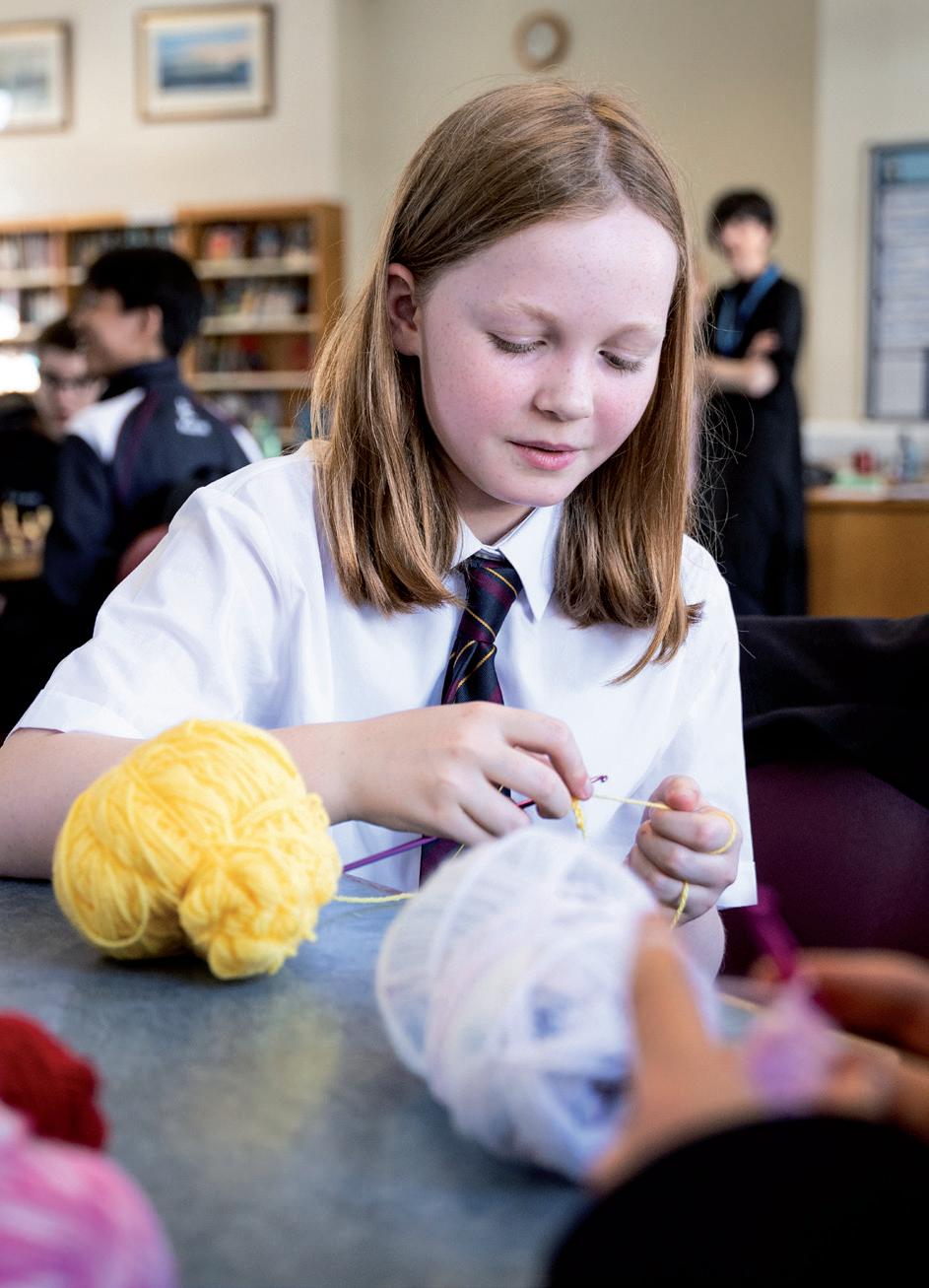
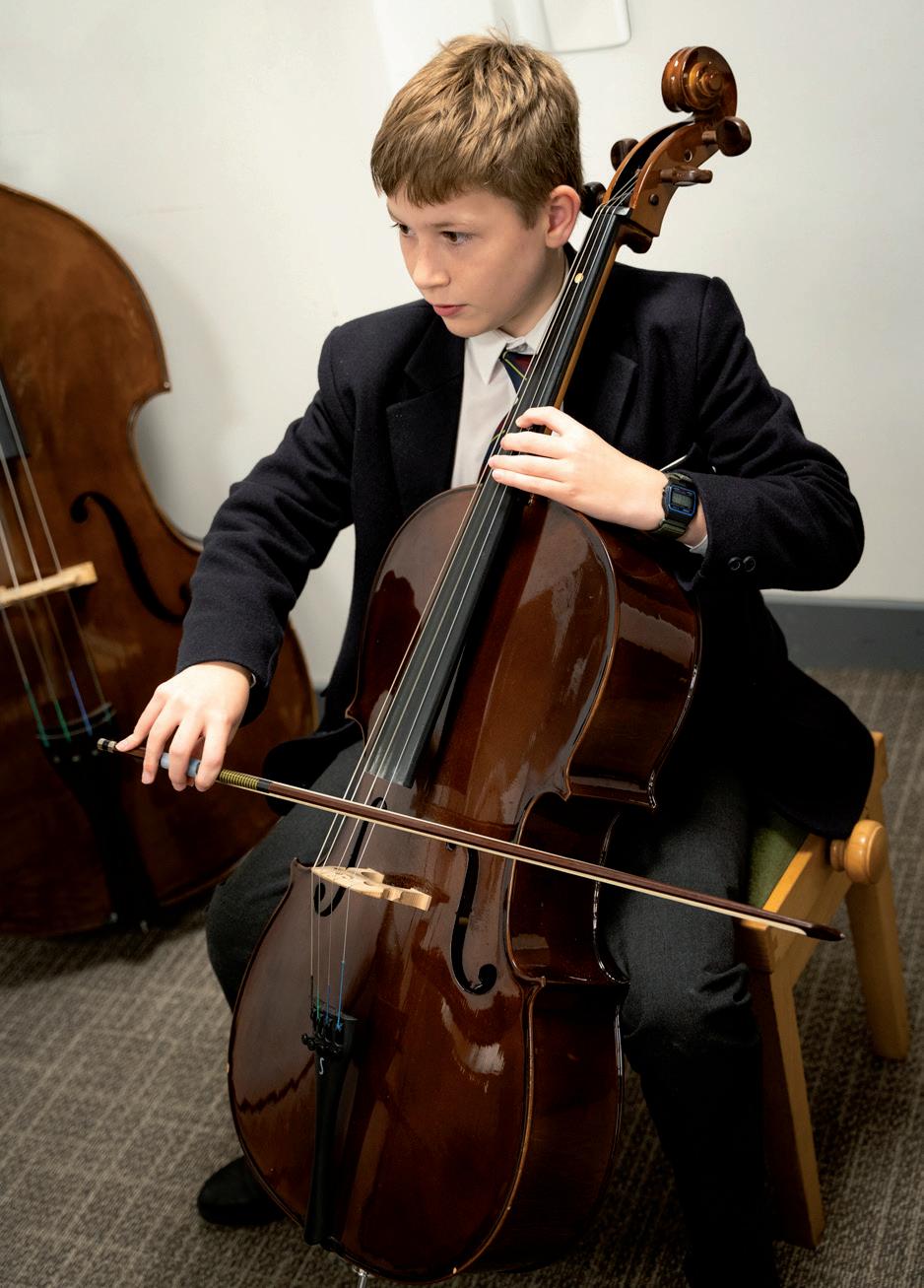
In today’s fast-paced educational landscape, extra-curricular activities are proving to be a cornerstone of holistic pupil development. With a diverse array of clubs and programmes available, pupils at BRA have the opportunity to hone social skills, forge lasting friendships, and engage in a variety of interests outside the classroom. From music and drama to athletics and academic enrichment, these activities not only enrich pupil life but also foster essential life skills.
At the forefront of this provision is the Academy’s commitment to offering a wide range of extracurricular activities designed to cater to differing interests and abilities of all our pupils. This includes everything from the Duke of Edinburgh’s Award scheme to computer coding clubs and debating societies, ensuring that every pupil can find an avenue for personal growth and enjoyment. According to the Principal, Mrs Woods, “Our goal is to create an inclusive environment where pupils can explore their passions. We believe that these activities are crucial for developing teamwork, leadership, and resilience as well as being just good fun.”
The variety offered allows pupils to face new challenges and take on responsibilities, whether through competitive sports or collaborative arts. “Participating in the debating club has not only improved my public speaking skills, but I’ve also made friends who share my interests,” shared Emily Warnock, a senior and active member of the club. “It’s a safe space where we can express our
opinions and learn from each other.”
Importantly, the Academy also acknowledges the significance of recreational activities in promoting wellbeing. Whether it’s the thrill of a competitive match or the gentle camaraderie of a casual arts workshop, the benefits are visible. These activities provide a balanced break from the class work and allow pupils to unwind, which is essential for mental health.
BRA emphasises that participation is voluntary and encourages pupils to pursue what truly interests them and so a balanced approach is on offer; the key is to enjoy the experience rather than always needing to excel, although we see a lot of excellence! At BRA, pupils leave with memories and skills for years to come.
The breadth of extra-curricular activities available at the Academy is astonishing. This wide and deep provision is a product of the devotion of caring teachers who go the extra mile in providing the opportunities for pupils to explore and extend their interests, and to take the lessons learnt in class to new heights and in new directions. This not only enriches pupil life at the Academy but also shapes well-rounded individuals equipped with vital social skills. As pupils discover new passions and talents, the Academy remains steadfast in its mission to provide an inclusive and engaging environment, ensuring every pupil can thrive both within and beyond the classroom.
Athletics Alternatives to Uni Society
BigBandBoardGames Club Book Club (Junior) Boys’ Choir (Form 3Middle 6)
BridgeChamber Choir Choir (Junior| Senior) Coding Club Coin Club Comic CreatorsClub (Forms1-3/Sept-Dec)
CrochetandCraftClub CreativeWritingCrossCountryClub Councils(Pupil| School)
CricketClub
DanceDebatingSociety(Junior|Senior) DramaClub(Forms1&2) DrawingChallengeClubDukeofEdinburgh’sAward EcoClub-“GreenGoblins” eSafetyEducationSocietyCommittee(Form2-Middle6)
FantasyArtClub(Forms1-3)
FilmClub(Form5)
Football(Senior) GameMakers(Forms1-3/January-June)
GetSet ‘Girls exploringTechnology, Science and Engineering together’ Girls’Code Club (Forms 1-3)
Golf
Greek Club Habitat for Humanity (Middle 6) Healthcare Society Hockey
Inktober Challenge (October, breaktime)
Law & Politics Society
Life Saving
ModernLanguagesFilmClub MadrigalEnsembleMedicalSociety OrchestraNetballClub PublicPoliticsinAction SpeakingSaveRugbyPupilWellbeingTheChildrenFund(Middle6)SchoolMagazineTeam OxbridgeSociety
Young Einstein Club
SeniorScriptureUnion(Junior|Senior) ArtClubSpanishShowJumping Schools Exchange Scheme SpeechAnd DramaClub Strings (Junior| Senior) Swimming Club Tabletop Gaming Society Tennis Trad. Music Group (Junior | Senior) The Creative Arts Society The STEAM Society Water Polo Weight Training Wind Band
In a time where pupil wellbeing is becoming increasingly complex, BRA’s adaptive pastoral care provision is designed to ensure that every pupil feels safe, valued, and empowered to become the best version of themselves. With a comprehensive approach that extends from the very first induction days through to ongoing daily support, the Academy emphasises the importance of a nurturing environment for all its pupils.
The commitment to pupil well-being is evident in the collaborative efforts of teachers, Class Tutors, Heads of Year, and Senior Staff. Together, they create a supportive community that prioritises emotional health alongside academic achievements. “We believe that happy, secure children are more likely to thrive in and out of the classroom. Our focus is on values, character, integrity and kindness,” states Mr Hughes, Vice Principal and Head of Pastoral Care.
The Academy’s nurturing ethos is further reflected in its tailored approach to individual circumstances. Staff members demonstrate compassion and flexibility, helping pupils develop independence and personal responsibility. “Every child is unique, and our pastoral care adapts to meet their specific needs. We work closely with parents and guardians to find the way through the difficult situations, and we work hard at supporting our young people so they can be part of the solution,” adds Mrs Thornton, Head of Form 4 Girls.
While the Academy’s approach is deeply appreciated by parents, the world is ever changing and each day seems to bring a new challenge to young people. BRA staff, however, remain confident that their strategies can adapt to the future needs of their pupils and driven by their passionate belief that every child matters, BRA staff are committed to their own continuous professional development to ensure the effectiveness of their pastoral skills. By placing wellbeing at the core of its educational philosophy, the Academy not only prepares pupils academically but also equips them with the social and emotional tools necessary for lifelong success. As they continue to foster a caring environment, the Academy sets its own high standard as it prioritises pupil welfare.


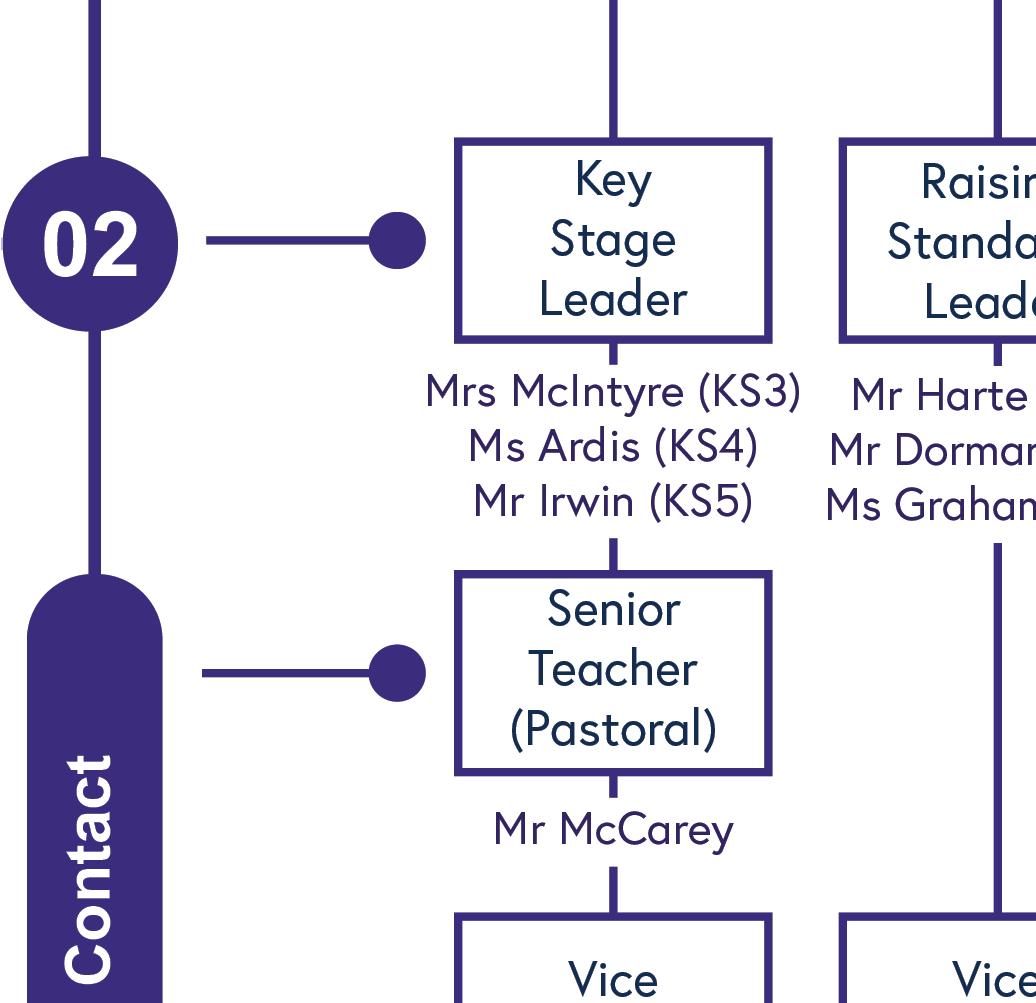

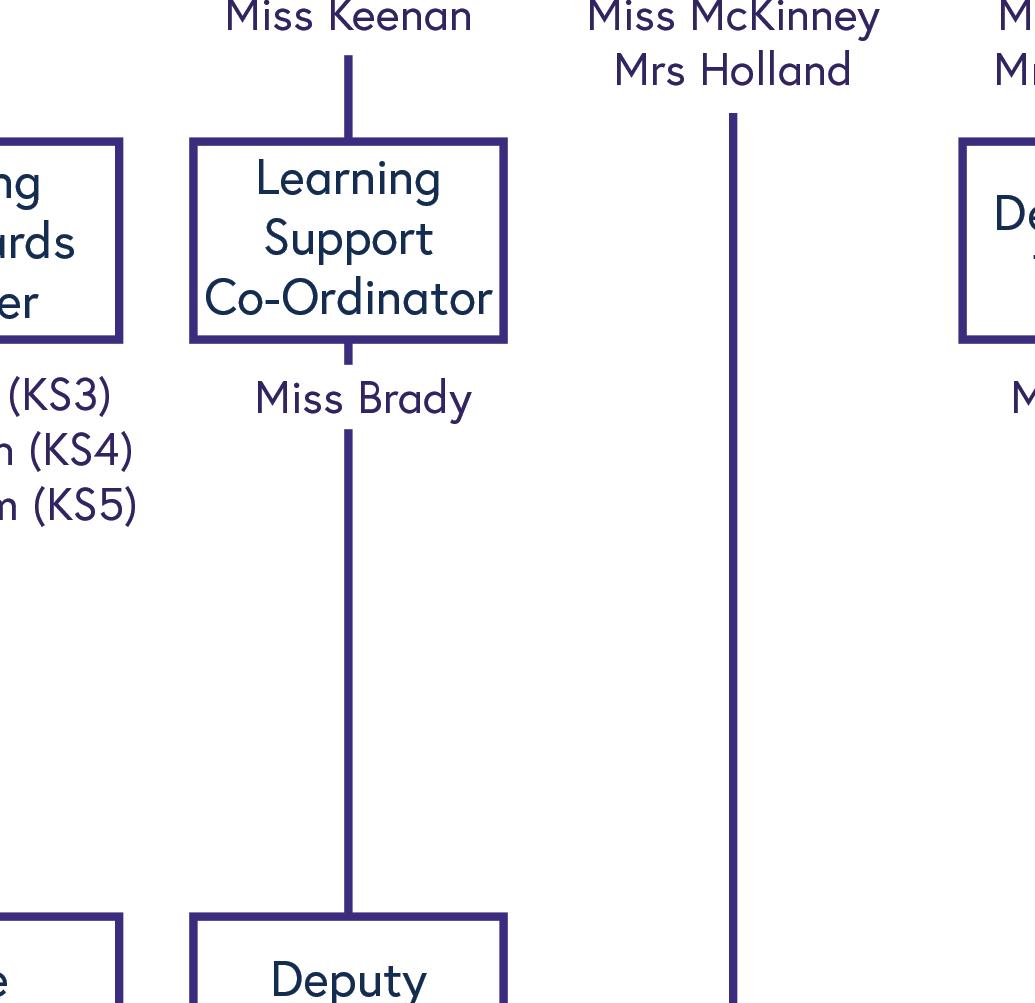


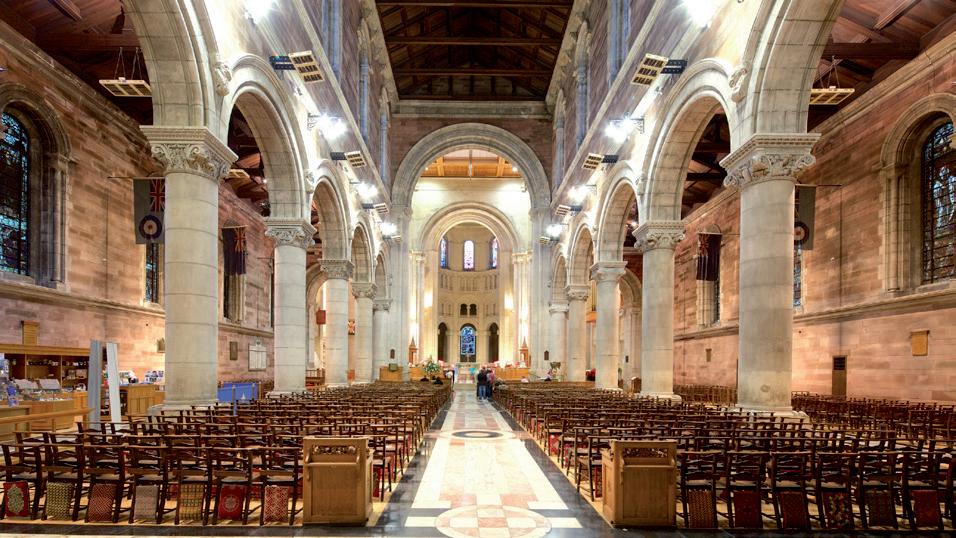
Belfast Royal Academy has long since been a school which provides its pupils with spectacular venues to showcase their talents. From Prize Day at the Assembly Buildings, where Academy pupils share their academic accomplishments, to the stunning St. Anne’s Cathedral, pupils have unique opportunities to take centre stage. “Our pupils work hard in rehearsals and seeing them recognised in such beautiful venues makes it all worthwhile” said Mrs McMullan (Director of Music). The Carol Service at St. Anne’s Cathedral is a stunning venue in the Academy’s calendar. Filled with festive spirit, the acoustics of the cathedral provide the perfect setting for the school choirs. The Ulster Hall hosts the annual Spring Concert and stands out as the pinnacle of the musical calendar. This event showcases a wide array of performances that span multiple genres, reflecting the diverse talents of the Academy’s pupils. From classical strings to contemporary bands, the concert brings together the whole BRA community for an unforgettable evening. Belfast Royal Academy’s commitment to providing exceptional venues for its pupils fosters the perfect environment where talent can flourish.
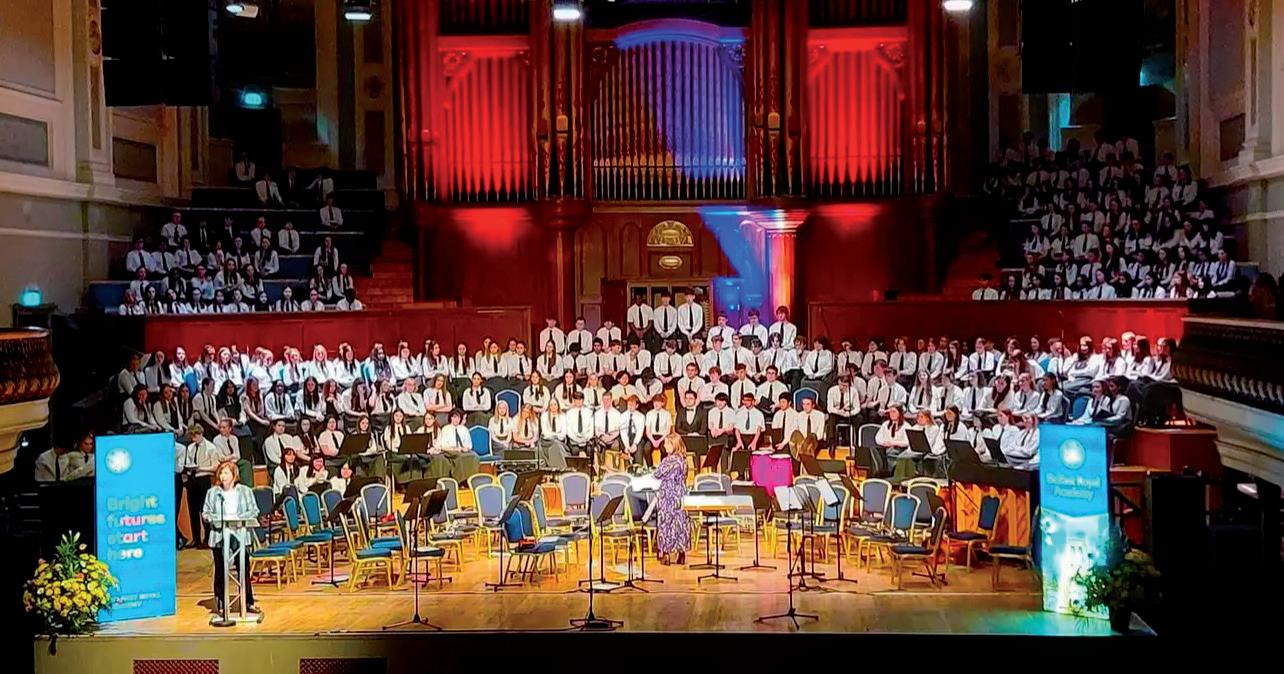
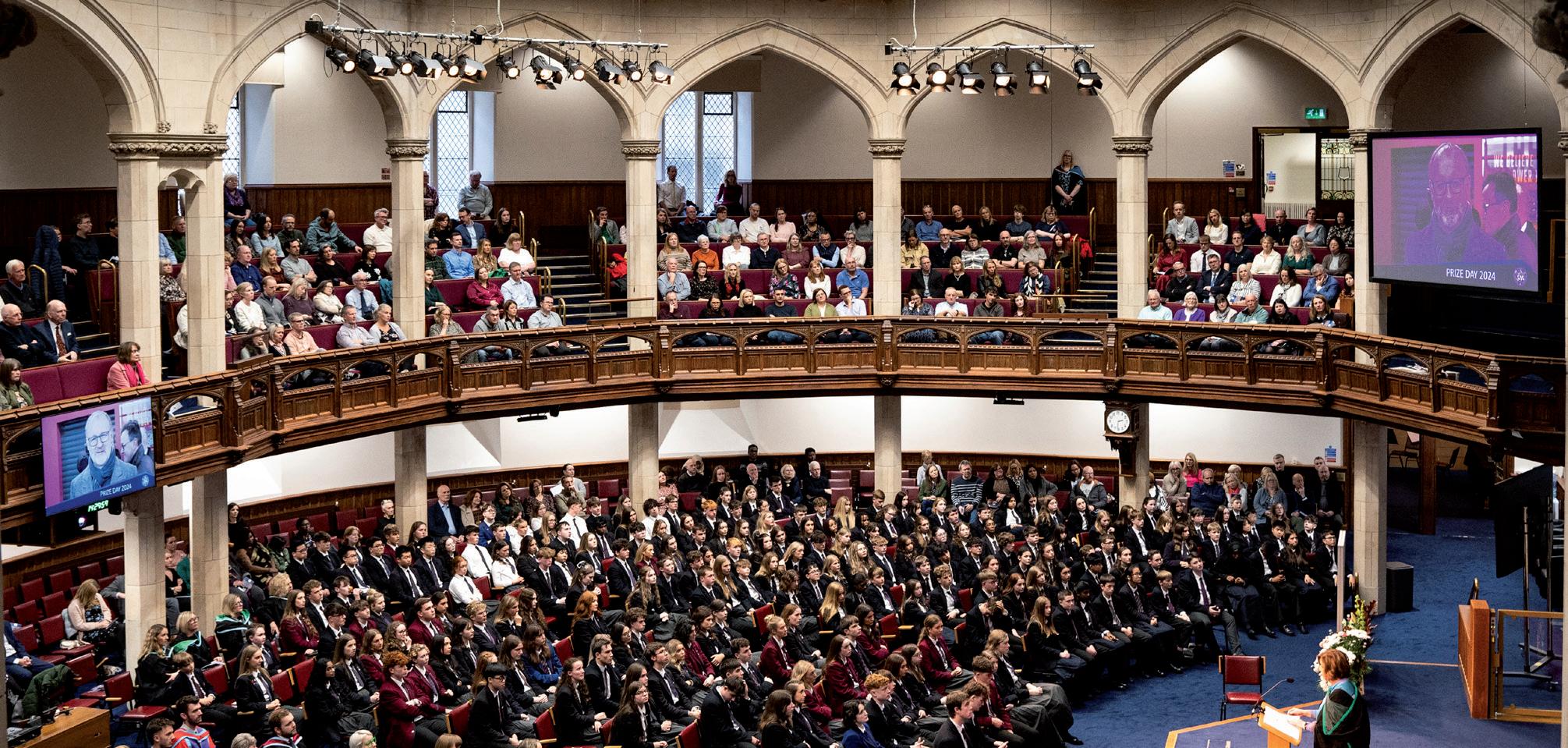
As Belfast Royal Academy embraces its future, it continues to uphold a legacy of academic excellence and community spirit, welcoming new pupils into a rich tradition that boasts a diverse and accomplished alumni network. With former pupils making impactful contributions across various fields, BRA not only nurtures individual talents but also fosters a dynamic community through its Alumni Association and the Friends of the Academy (FOTA).
Since 1785, Belfast Royal Academy has witnessed generations of scholars, artists, and athletes develop within its corridors. Notable alumni including Sir Henry Pottinger, the first Governor of Hong Kong, New York based fashion designer, Nicola Glass, and international rugby star Iain Henderson personify the Academy’s commitment to cultivating excellence and preparing pupils to play their role on a world stage.
The Academy has always been a beacon of educational quality within the community of North Belfast and we are proud of our alumni who
continue to make headlines and shape society both locally and globally. Their achievements serve as an enduring inspiration for our current pupils.
Along with The Old Boys’ and Old Girls’ Associations, The Academy Alumni Association plays a vital role in connecting these former pupils to one another and to their school. It organises social events and reunions that allow alumni to renew old friendships, create new ones, and stay informed about the evolving dynamics of the school. These gatherings not only strengthen bonds but also enrich the school community, as alumni share their experiences, insights and opportunities.
Additionally, the Friends of the Academy (FOTA) plays an integral part in promoting community spirit within the Academy. Comprised of parents and staff, both past and present, FOTA actively engages with the chool by supporting events such as Open Days, uniform sales and the annual Carol Service. Furthermore, they undertake fundraising initiatives to enhance facilities and resources for current pupils.
“FOTA truly embodies the spirit of community at Belfast Royal Academy,” noted Mrs Kim Burns, Chair of FOTA and parent of a past pupil. “Our fundraising efforts have made a tangible difference, whether it’s through providing drinking water dispensers or supporting the Merit Scheme. It’s heartening to see parents and staff coming together for the benefit of our children.”
As Belfast Royal Academy continues to advance its educational legacy, the importance of community and alumni engagement remains paramount. The school invites current pupils and their families to connect with both the Alumni Association and FOTA, fostering an enduring sense of belonging and collective purpose.
For further information on how to engage with the Academy’s alumni and community initiatives, please visit the Alumni section on the BRA website or contact the School Office directly.
Since 1785, the Academy has provided “unspeakable advantage” to its pupils.
The Rev. Dr. James Crombie founded the Belfast Academy to provide the sons of well-to-do merchants with an education of a high standard. The Academy was originally situated near St Anne’s Cathedral and consisted of four separate schools – the Classical School, the Mathematical School, the English School and the Writing School.
When the pupil population outgrew the original premises, a new building was constructed on the Cliftonville Road and opened in 1880. In 1888, Queen Victoria granted permission for the school to be named as Belfast Royal Academy. The school crest showcases these three key dates – 1785, 1880 and 1888 – with the rose, the thistle and the shamrock,
1880
1785
BRA was founded as The Belfast Academy

1785
The US Congress names their currency as the dollar and adopts decimal coinage
alongside the Royal Arms, the Arms of the City of Belfast and those of the Province of Ulster.
In 1900, girls were permitted to be educated in the senior school but were strictly segregated. Girls entered and left the Crombie building by the tower on the right hand side and boys were required to enter and leave by the tower on the left. They were forbidden to see each other during the school day and had separate recreation areas outside.
Headmaster Mr A. R. Foster reorganised the school on a co-educational basis in 1923, with boys and girls mixing for all academic lessons, and teaching organised by Department. Mr Foster also introduced the prefect system and rugby as a game for boys.
The new Preparatory Department on the Castle
The school moved from Academy Street, near St. Anne’s Parish Church to its current location, Cliftonville Road
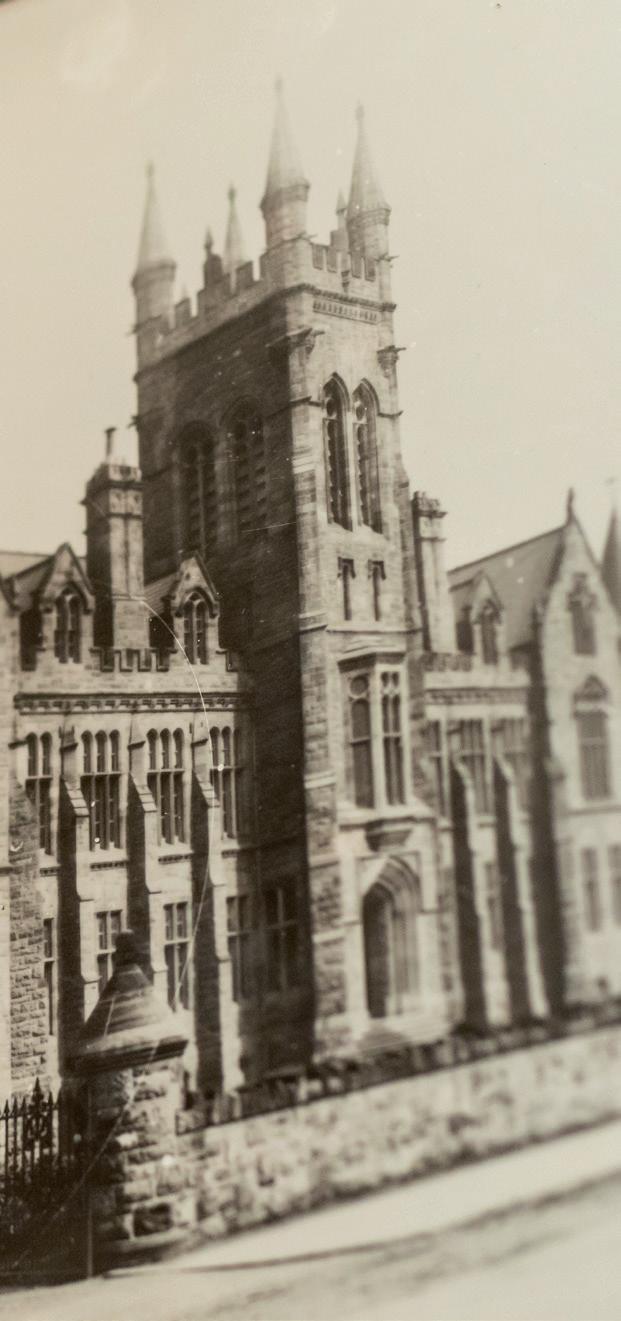
1865
Assassination of Abraham Lincoln, the 16th President of the United States
1879
Thomas A. Edison invents the incandescent electric light bulb
1888
Queen Victoria grants permission for the Academy to be called Belfast Royal Academy
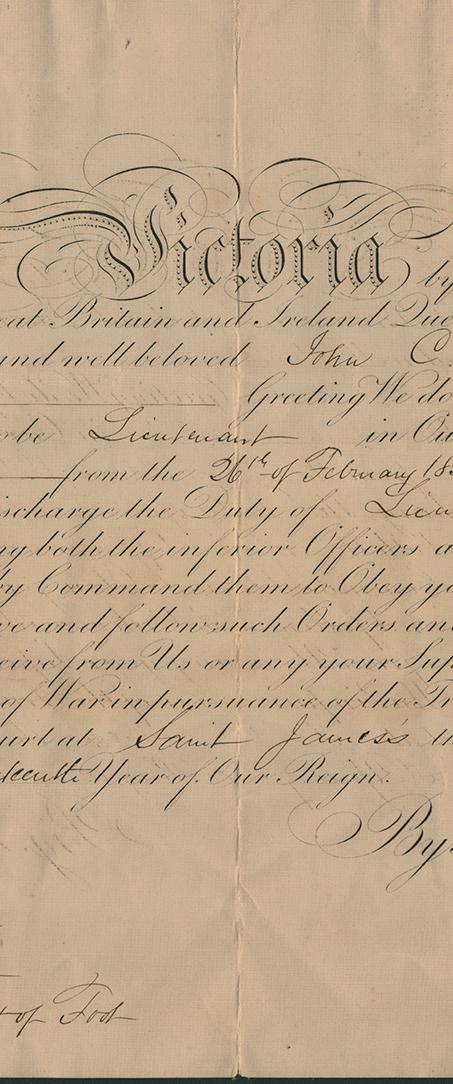
1884
Oxford University Press publishes the ‘A’ volume of its New English Dictionary. It takes 37 years to reach ‘Z’
Grounds site was opened in 1965, a swimming pool was opened in 1974 and Roughfort playing fields near Mallusk were developed in 1978.
To mark the Academy’s bicentenary, a new sports hall was built in 1985. Further major developments included a new Mathematics block in 2000 and the £4 million project in 2016 which provided a range of new facilities including a music suite, a learning support area, renovated classrooms and the Jackson Suite.
We have been instilling academic excellence and developing self-confidence and character since 1785. Be part of the generations of young people who have benefited from an amazing BRA education for 240 years.
1900
Girls, who were pupils in the Preparatory Department, could continue their education in the senior school, but they were strictly segregated from the boys
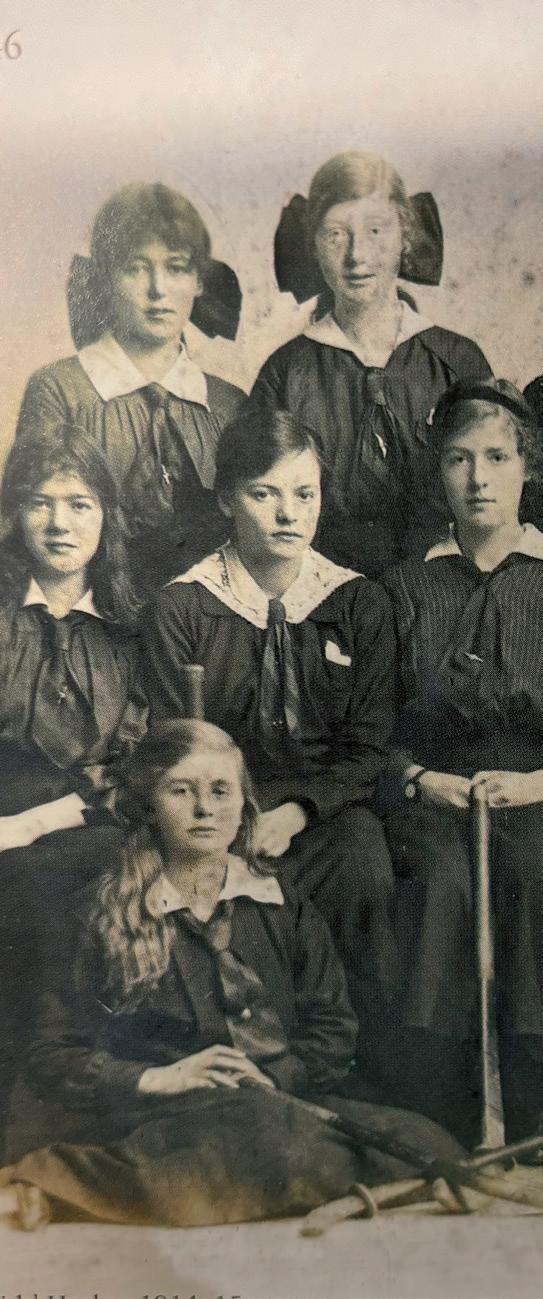
1889
The completion of the Eiffel Tower, Paris, France
1896
The first occurrence of the modern Olympic Games takes place in Athens, Greece
1965
The new Ben Madigan Preparatory Department on The Castle Grounds site was opened

1901
Guglielmo Marconi succeeds in sending the first radio transmission across the Atlantic Ocean
1912
RMS Titanic sets sail from Belfast on the 2nd of April
1967
First human heart transplant, Cape Town, South Africa

2016
1985
1978
1974
The swimming pool was opened
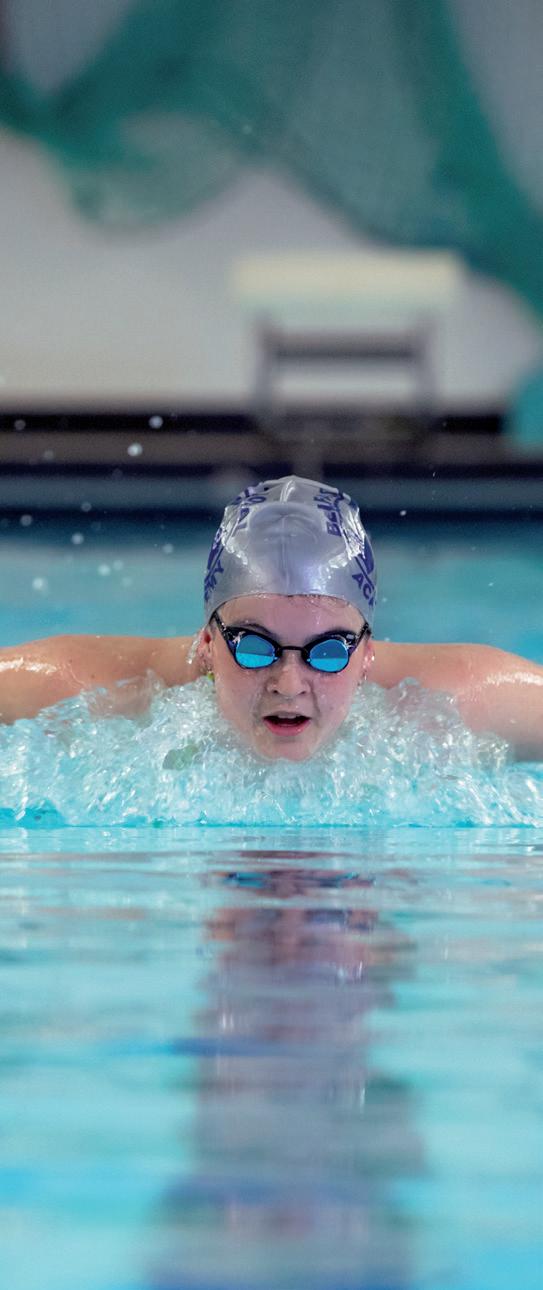
1969
Concorde makes its first supersonic flight with maximum cruising speed of 1,354 mph
Roughfort playing fields near Mallusk were developed

1976
CN Tower opens in downtown Toronto 1976
US Viking 1 lands on Mars at Chryse Planitia, 1st Martian landing 1984
To mark the Academy’s bicentenary, a new sports hall was built, improving the teaching of PE and facilitating sports such as badminton, basketball, netball and volleyball

Apple Computer Inc. unveils its revolutionary Macintosh personal computer in a Super Bowl TV ad directed by Ridley Scott 1989 Fall of the Berlin Wall

A £4 million project provided a range of new facilities including a highly innovative music suite, modern learning support area, renovated classrooms and enhanced dining facilities
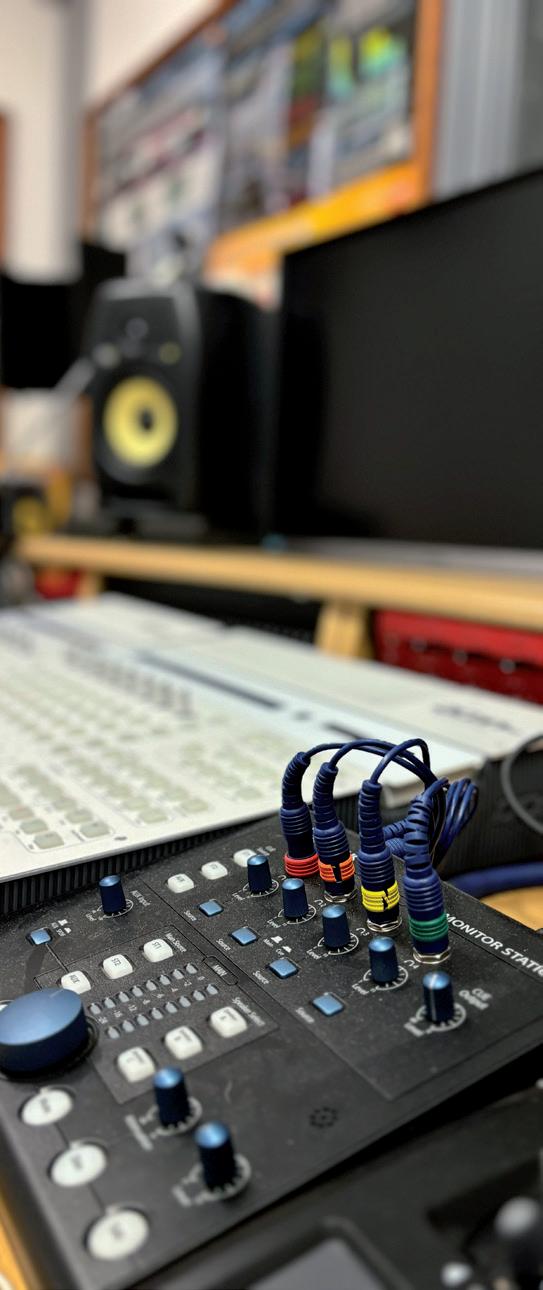
Dolly the sheep is cloned 2001
Terrorists attack the World Trade Center in New York City and the Pentagon outside Washington, D.C.
2017
Mrs Hilary Woods was appointed as Principal - the first female Principal of Belfast Royal Academy in its 232 year history

2016
United Kingdom votes in the Brexit referendum to leave the European Union
2019
The COVID-19 pandemic began with an outbreak in Wuhan, China
BRA understands the deep satisfaction of academic study and appropriate challenge: of reading and discovering, debating and challenging, thinking and reflecting.
As a school which prides itself on excellence and ambition, the curriculum must be both rigorous and engaging, both academically and in terms of pupils’ personal development.
The respectful and positive relationships between teacher and pupil is the foundation to success at the Academy and the committed and dedicated subject specialists provide opportunities and challenges inside and outside the classroom.
Moving from one stage of education to the next is always a pivotal moment in a pupil’s school career and the quality of the taught curriculum will be a key factor in the choice of school.
The curriculum at BRA is designed to not only challenge pupils, but also to present exciting new opportunities for learning and for developing new skills.
Form 1 pupils will study a number of subjects that they may not have been previously introduced to
We are delighted and extremely proud to announce that Megan Flood, one of our Middle Sixth pupils, won first place in the AS-Level Best Film award for CCEA. Megan’s film entitled “Behind closed doors”, was described by the judges as having “a stylish approach to lighting, camera and editing”. They were bowled over by its witty storytelling and “killer punchline”. Congratulations Megan on your “killer” headline.
such as Latin, Modern Languages and the separate sciences of Biology, Chemistry and Physics, and will study other subject disciplines in greater depth.
The curriculum programme at BRA for pupils in Forms 1 – M6 is designed to facilitate academic rigour, to provide opportunities for pupils to study to a broad range of subjects and to assess and develop soft skills such as public speaking and team building. Practical subjects such as Drama, Home Economics, Music, and Physical Education sit alongside English, History, Mathematics, Modern Foreign Languages, Latin, the Sciences and Technology. Personal, Social and Health Education, Citizenship and RSE programmes enrich the curriculum and support personal and social development.
At BRA emphasis is squarely placed on providing an outstanding, broad and balanced curriculum which fosters the pursuit of learning for its own sake, whilst ensuring that our pupils are gaining the skills they need to prepare them for higher education and for the work environment. The heritage of the Academy is one grounded in quality education. It has always been this way and it continues to be our main core business.


Well done to Riya Raghuram who received 1st place in Northern Ireland for combined scores in CCEA A-Level Chemistry, Biology and Physics.
Congratulations also to Ryan Ferguson who received 3rd place in Northern Ireland for combined scores in CCEA A-Level Chemistry, Biology and Physics.
Proud headlines indeed!
BRA has a long and proud tradition of helping pupils progress to Oxford and Cambridge.
We currently have 10 past pupils enrolled in Oxbridge reading, Natural Sciences, Medicine, Physics, Mathematics, Law, French, History, Latin and Geography.
We believe our pupils can make successful applications to Oxbridge, so we provide a personalised programme of support. Through this process they gain the self-belief and skills necessary to fulfil their potential and transition to two of the best universities in the world.
At Belfast Royal Academy we take great pride in our pupils’ appearance and believe our school uniform is an important part of creating a sense of belonging to the Academy as well as setting the high standards we expect from all of our pupils.
We encourage our pupils to wear their uniform with pride and we have high expectations of pupils with regards to wearing their uniform correctly, especially on the journey to and from school.
1. A single-breasted navy-blue BRA blazer (or a Sixth Form blazer).
2. A BRA tie in House colours.
3. A white shirt.
4. School Jumpers – a jumper is not a compulsory item of uniform
(a) Forms I, II and III: A regulation mid-grey V-neck pullover with stripe or a regulation navy-blue V-neck pullover with stripe.
(b) Forms IV, V, LVI and MVI: A midgrey V-neck school pullover, stripe optional, or a plain mid-grey V-neck school cardigan.
5. Black trousers. Full length and regular fit with dark grey or black socks (not ankle or sports socks).
Or
Forms I, II and III:
A regulation navy-blue skirt (mid-calf length) with plain black tights or black knee socks.
Forms IV, V, LVI and MVI:
A regulation grey skirt (mid-calf length) with plain black tights or black knee socks.
6. Plain black or brown leather shoes that are able to be polished. Patent shoes are acceptable.



Warnocks Ltd., 791-793 Lisburn Road (100m from Balmoral traffic lights), BT9 7GX
School Days NI Ltd, 434 Newtownards Rd, Belfast, BT4 1HJ
School Days NI Ltd, 273 Antrim Rd, Glengormley, Newtownabbey, BT36 7QN Northend School Wear, 331 Antrim Road, Belfast, BT15 2HF
Signature School, Carrick, 10A Green Street, Carrickfergus, BT38 7DT
The Jeanery and the School Room, 2 Goland Buildings, Glencairn Park, Glengormley, BT36 5EN
The Sports Company, 553 Antrim Road, Belfast, BT15 3BU
Podium 4 Sport (Games/P.E. kit only), 40 Montgomery Road, Belfast, BT6 9HL

The uniform for Middle and Senior school pupils differs in the following ways:
• Blazer: pocket shows the crest.
• Tie: Sixth Form tie
• Skirt: changes to grey.
• Honours blazer: these may be awarded to Seniors for outstanding commitment to sport (maroon) or the arts (blue).

It was a cold dark November day when a dear friend of BRA arrived through the school gates. Back once again to a place he knows so well, a place intertwined with who he was and who he is. Mr Ken Knox, a past pupil, a parent, retired governor and past Warden, has many a story to tell about when he was a pupil here at the Academy. Tasked with helping to unpack his story is Basel Aidaroos, a Form 2 boy, interested in how things used to be. Basel wasted no time in getting to know Ken.
You are a past pupil of BRA, so when were you here?
Now, we’re going back a few years, Basel but I was here from 1957 to 1968 so 12 years in school years. If you’re wondering why 12 years when Form 1 to M6 is 7 years; I actually attended Wingfield Preparatory Department which was on this site and I was there for 5 years. That was before it was called Ben Madigan having moved up to the Castle Grounds. As a matter of fact, my old classroom is now the Principal’s office and we used the doorway in the turret to go in and out of our classroom.
Why did you decide to come to BRA and what were the pupils like?
My parents made the decision for me to go to BRA. My brother and sister both went here so BRA was very much part of our family. I had to do the 11+ and to be honest I struggled a bit to begin with, so my parents had to pay for me to attend in Form 1 but then, having proudly passed the resit paper, I earned my way into Form 2, never looking back. I actually knew quite a few of the pupils in my year already because they were at my primary school, about 50 of them, but I made friends quickly with the other 70 or so pupils I didn’t know.
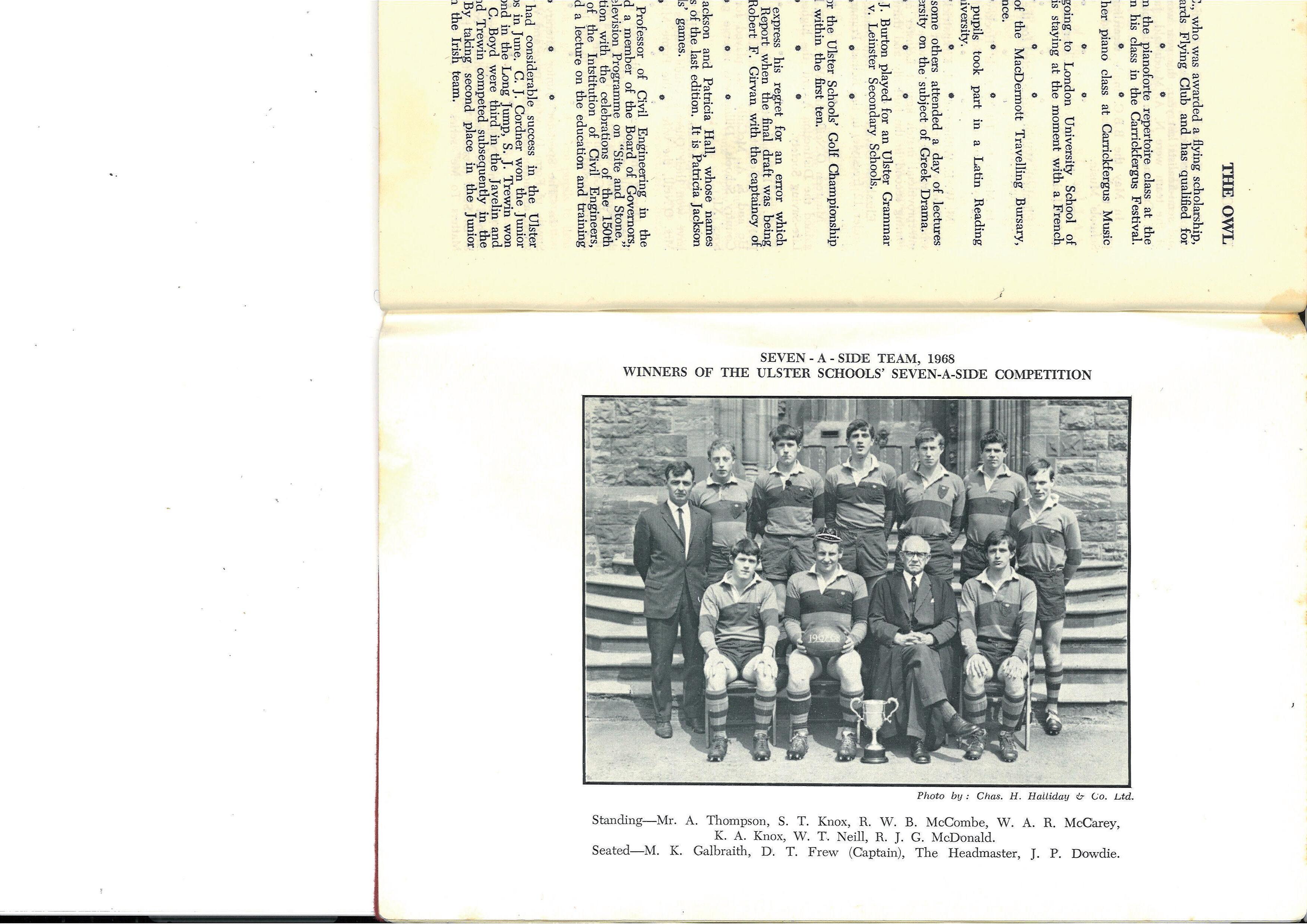
How did you get to school?
Getting to school was easy. My mother or father usually gave us a lift and we also shared lifts with a neighbour who also went here. Going home was more involved and a journey that offered an interesting business proposition! To get home, I had to take the bus and each journey was 3d which my parents would entrust to me for the journey (1p in today’s money). Now I realised that if I walked home and if
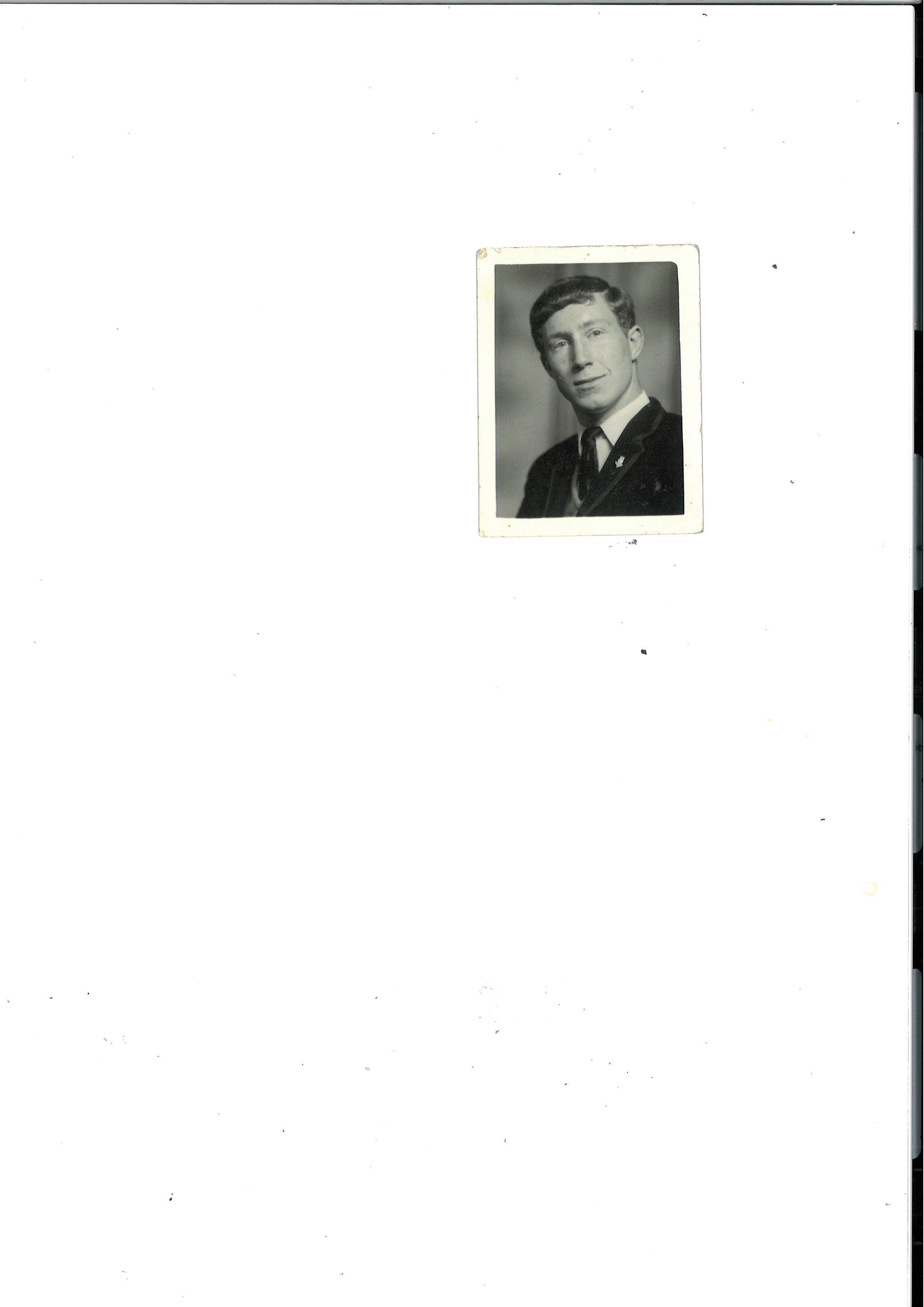
including the first ‘r’ in February. Let’s just say I had to learn quickly! I don’t make that mistake anymore.
2019 when Covid arrived and I decided that it was time to retire. My two sons now run the business and it just seems to keep on growing.

Looking back now, how significant was your time at BRA?
Get involved in school life as much as you can and do it as soon as you arrive.
Well, sport was a big part of what I learnt at BRA, not just how to play the game, but the lessons of teamwork and commitment. We trained four days a week with a match every Saturday. Mathematics and English lessons were really useful for my business; in those days, there were no computers to do all the hard work. I was also in the Scouts Troop where I learnt a lot of skills. I can make a canoe out of wood and canvas and it will even float, believe it or not. We would spend hours in the basement under the Crombie making our own canoes and, after getting over the smell of the glue, we would take them to the Fermanagh Lakes on our camping weekends.
We had great memories with George McConnell and Robin Reid on those weekends; these memories stay with you for a life time and that makes them significant – they become who you are.
Did you stay in touch with BRA?
Oh yes. My three children all went here and I’ve currently got three grandchildren here with another hoping to join also. In 1988, I joined the Board of Governors and I’ve only just retired from the Board in February 2024, serving for over 35 years.
Have you stayed in touch with people you knew at school?
Yes. I’m a member of the Old Boys’ Association and it is a very active meeting every month for dinner. There will be 30 to 40 of us who meet and then once a year there is a larger meeting with about 130 –140 people at that. We also have an annual dinner in Edinburgh and in London. So this really helps with keeping in touch with those who went to BRA.
What has changed the most?
Probably the site itself. When I was here, there was playing space where the Jackson Building and the Assembly Hall are now. There was so much more room and with fewer pupils – remember there were only about 120 in each year group, now there is over 200. There has been a lot of growth and a lot of building. As a Governor I’ve seen the building of the Technology block, English block and the Mathematics building. The number of subjects and staff have increased and the expertise of the staff in this school are surely second to none.
What advice would you give a new F1 pupil coming to BRA?
I have 3 pieces of advice:
Get to know your way around the Academy as quickly as you can.
Get involved in school life as much as you can and do it as soon as you arrive.
Ask for help – just as quickly as a need arrives, ask for help.
What is the best thing about BRA?
The opportunities it provides. It is a school which really does look out for each and every one of its pupils and it provides an education both inside and outside of the classroom which will take pupils, who are prepared to work hard, to anywhere in the world and to any job in the world. It’s also my old school.
A final word from Basel:
Thank you, Mr Knox, for sharing your memories with me and for all you have done to support and grow BRA to the school that it is today.
Basel Aidaroos (Form 2).
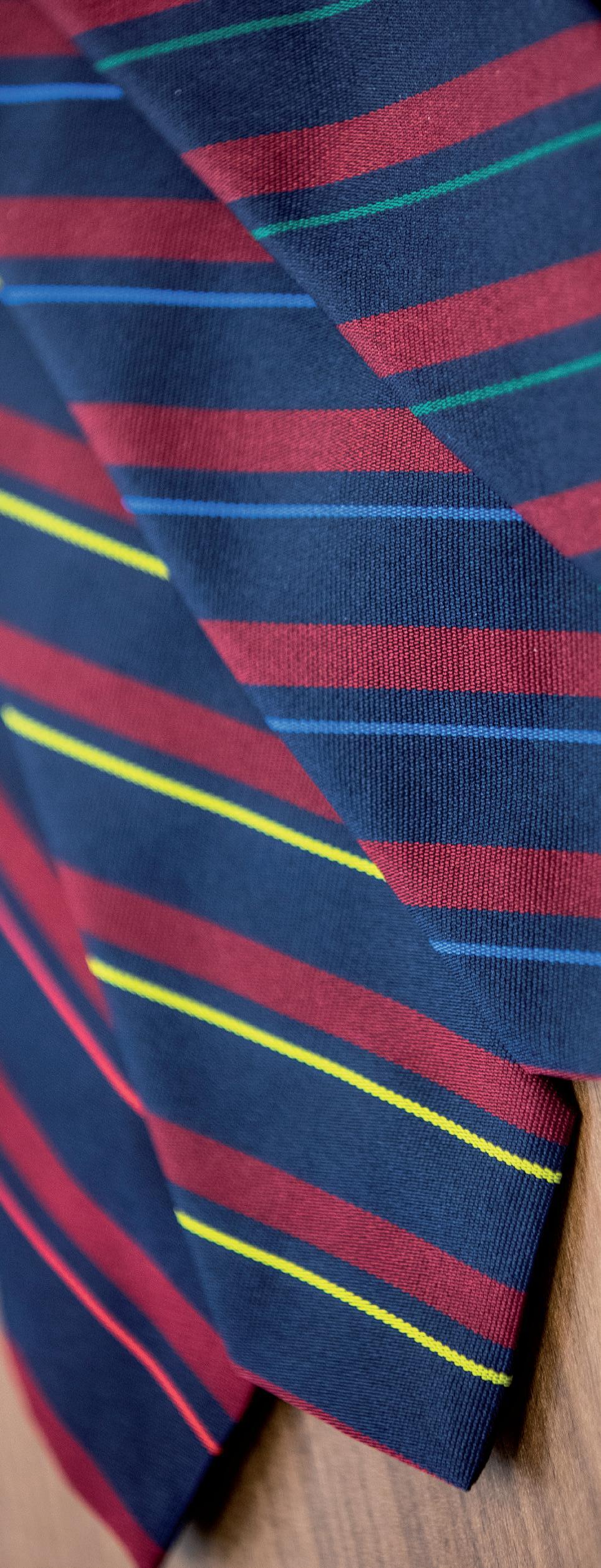
As a way to welcome our new pupils to the school family each year, the Old Boys’ and Old Girls’ Associations gift each pupil with a school tie.
Every pupil who attends Belfast Royal Academy is assigned to one of four ‘Houses’ which they represent during their time at the Academy. The four Houses are named after prominent people associated with the Academy. The coloured stripes on pupils’ ties indicate which house they belong to.
The four houses are Cairns, Currie, Pottinger and Shaw.
The House System gives our pupils the opportunity to be rewarded for efforts and achievements in all areas of school life and it promotes participation in a wide range of cultural, intellectual and physical activities.
It develops teamwork and learning through experience and promotes leadership opportunities. It also provides an enjoyable competitive programme of events over the school year culminating in the annual award of the Evans Trophy to the winning House at Prize Day. As a mark of celebration at the end of each term, the flag of the winning House flies from the Crombie Tower.
The House System complements and is in addition to the pastoral care structures within the Academy. House Assemblies are held once a month and inter-house competitions and activities provide opportunities for pupils to get involved in all aspect of our school, help out in the school and wider community and assume leadership roles in school.
Each house have captains and vice captains who have been voted for by their fellow pupils. Pupils are involved in running the termly house meetings thus promoting pupil leadership and responsibility.





Cairns House commemorates a most eminent old boy - Sir Hugh McCalmont Cairns, who studied Classics at Trinity College Dublin after school, before being called to the Bar to start his legal career. In 1852 he entered Parliament as a member for Belfast and became a QC in 1858. He was a senior Conservative in the House of Lords then went on to be appointed SolicitorGeneral and was knighted in 1858. In 1868 he was made Lord High Chancellor of Great Britain.
The emblem for this house shows a Portcullis which has become the recognised symbol for Parliament.


Currie House is named after Sir Donald Currie.



After leaving school he entered the shipping office of a relative in Greenock before moving to the Cunard Steamship Company where he later become Head of the cargo department and set up offices across Europe. In 1862 he founded The Castle Shipping Company, which later become the famous Union Castle Line and set up the first sailing ships between Liverpool and Calcutta on a regular basis.
The anchor of the Currie emblem is a fitting reminder of his success in the shipping industry.





Pottinger House is named after Sir Henry Pottinger who negotiated the Treaty of Nanking by which Hong Kong was ceded to Britain. He was the first Governor of Hong Kong then later The Governor of Cape Colony and Governor of Madras.
The Pottinger emblem depicts a chinese dragon to symbolise his tenure as Governor of Hong Kong.





The Shaw House commemorates Mr James Shaw who was known amongst his pupils as ‘Papa’ Shaw, was Head of the Classical School and latterly Vice-Principal until his retirement in 1923. He had taught at the Academy for 43 years and on his retirement at the age of 83 was probably the oldest serving schoolmaster in Ireland and Britain.
The helmet of the Shaw House depicts those worn by the Ancient Greeks from which the Classical School is born.

As pupils navigate the many options of higher education and career choices, Belfast Royal Academy provides clarity with a Careers Education, Information, Advice and Guidance (CEIAG) programme designed to empower pupils with the skills and knowledge necessary for future success. With a focus on the individual, BRA is dedicated to preparing its pupils for the exciting opportunities that lie ahead.
We live in an age of abundance. From overflowing grocery aisles to endless streaming libraries, choice reigns supreme. This extends to our careers, where a multitude of careers call to our young people, each promising fulfilment and success. Yet, this very abundance can become a burden, paralysing pupils with indecision and feeding the paradox of choice: the more options pupils have, the harder it is to choose, and the less satisfied they may be with their decisions. In BRA, this challenge is met head on.
The CEIAG framework at Belfast Royal Academy encompasses a wide range of integrated activities delivered by an experienced team of staff and external partners, including Unifrog and the Careers Service NI. Through tailored guidance and handson experiences, pupils are guided to make informed decisions about their futures, allowing them to unpick the paradox of choice.
Belfast Royal Academy works hard at inclusive education by prioritising the needs of pupils with Learning Support Needs. With a dedicated Learning Support Co-ordinator (LSC), the school is ensuring that all pupils receive the support they require to thrive academically and socially.
The LSC leads a team of Classroom Assistants who play a crucial role in delivering personalised support to pupils facing learning challenges. This team not only focuses on academic assistance but also provides essential pastoral care, fostering an environment conducive to growth and wellbeing. Each pupil on the SEN register is carefully monitored, with Individual Education Plans (IEPs) developed annually for those with formal statements, outlining tailored targets that promote their academic progress.
“We believe that every pupil deserves an engaging and inspiring educational experience,” said Miss Brady, the LSC at Belfast Royal Academy. “Our Learning Support Team is integral to achieving this goal, as they help pupils build their independence and self-esteem.”
The proactive approach to inclusivity means that concerns about pupils’ learning can swiftly be communicated to the Learning Support CoOrdinator, ensuring timely interventions. This structured method not only supports the individual needs of pupils but also cultivates a supportive school community.
Parents and teachers alike have acknowledged the positive impact of the Learning Support Team. As Belfast Royal Academy continues to enhance its learning support provision with a deep commitment enquiry based development as new and emerging practices are considered and integrated.
This proactive and compassionate approach to learning supports and rewards every pupil, regardless of their challenges ensuring they have access to a rich and fulfilling educational experience at BRA.
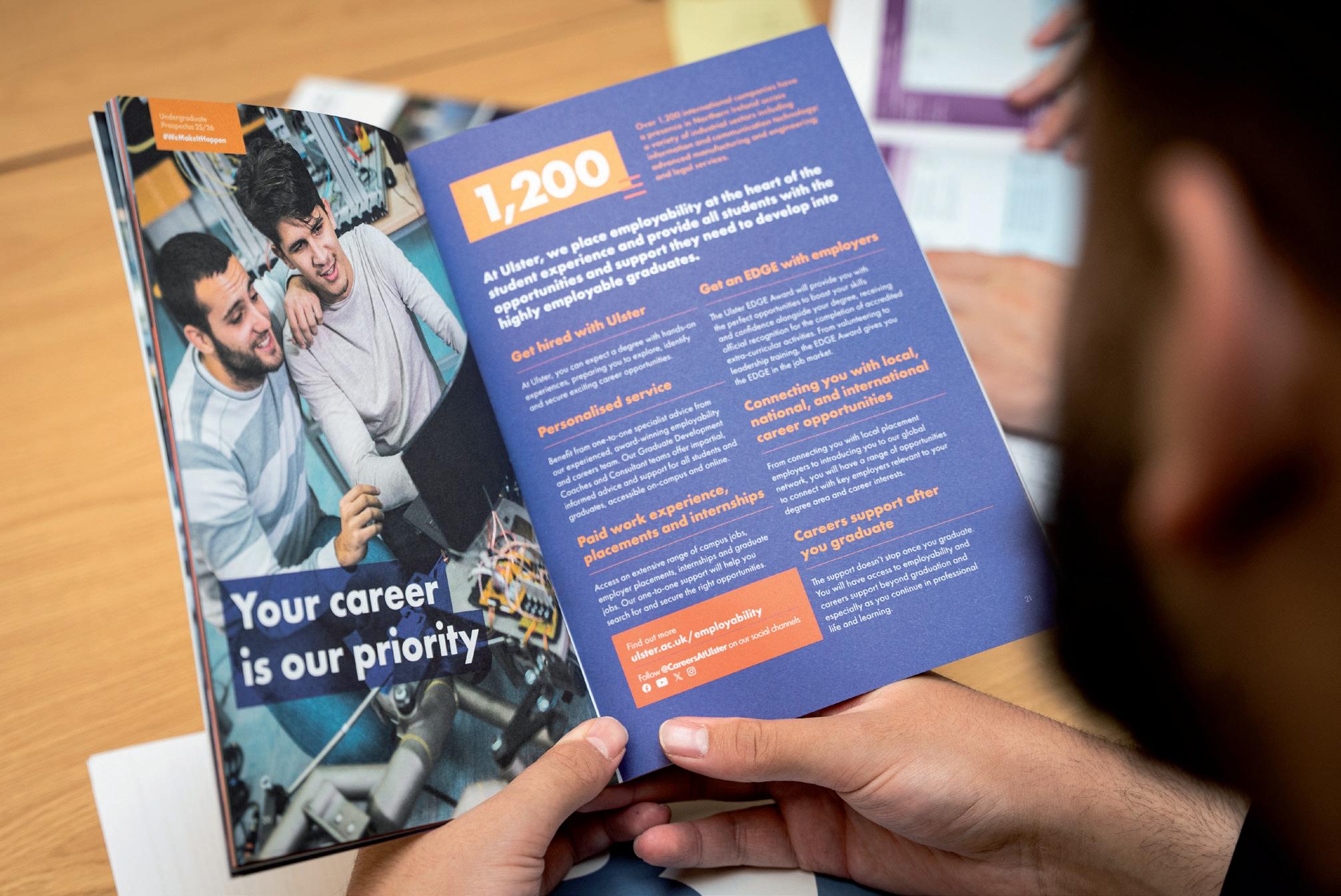
“Supporting our pupils in achieving their aspirations is our top priority,” said Mr Murphy, Head of Careers at Belfast Royal Academy. “By collaborating with subject specialists, working with industry, alumni and parents across the labour market, we ensure pupils explore a wide range of career paths but in line with their interests, personality and ability. When they do this, they gain valuable insights into the world of work and themselves.”
The Academy’s efforts have made a difference, with the vast majority of pupils securing places at their first-choice universities. This success can be attributed to BRA’s commitment to providing subject-specific guidance across all year groups, individual advice for their Form 5 pupils, and
workplace experiences for Sixth Form pupils.
“It’s important to remember that it’s normal to feel uncertain about the future,” noted Mr Murphy. “The support we provide at Belfast Royal Academy makes it easier to navigate these decisions, equipping pupils with the skills to make sound choices and instilling in them the confidence to pursue their ambitions.”
It’s clear that the pupils in BRA are prepared to thrive in higher education and beyond, ensuring they are ready to face the ever-changing landscape of local and global career opportunities.
Parents and guardians form a crucially important link in ensuring we realise our aim to meet individual pupils’ needs.




Reports for all pupils are issued to parents / guardians following the winter examinations. Progress reports are uploaded via SIMS Parent App for pupils in Forms 4 - M6 at three key points in the year following the Tracking Assessments. An end of term report is produced for Forms 1 - 4 following the summer examinations.

The weekly emails of pupil notes keeps parents abreast of events and developments that occur.


In September, there is an induction meeting for pupils and parents at the beginning of each Key Stage.


The Academy’s website, Facebook page and Sports Instagram page reflect current news including pupils’ achievements, sporting events, forthcoming events and news updates. The Owl (our annual magazine) is published each autumn term and can be viewed online on our website.



BRA uses an online system called SIMS Parent to communicate key information with parents, accessed either through an app on your mobile device or via the website: (https://www.sims-parent.co.uk).
This enables parents to access up-to -date information about their child’s school life as well as supporting their development and progress.


There is a parent / teacher consultation for each year group arranged once a year. Parents are also welcome to speak to Heads of Year, Key Stage Leaders, Class Tutors or subject teachers if they have any concerns which need to be addressed promptly. The Principal and Vice Principals are always available to discuss a pupil’s progress and pastoral well-being.

A number of social and sporting events are arranged every year, often with the support of the Friends of the Academy, to enable staff, pupils and parents to meet less formally.
The capital fee of £140 per pupil is a compulsory annual charge and should be paid at the beginning of each academic year. In addition, we also request a supplementary parental contribution of £350 per pupil.
The combined annual charge amounts to £490 per pupil, which is equivalent to a daily payment of less than £1.35, which is excellent value for money for the high quality, rounded education offered at our school.
Whilst the supplementary parental contribution is not mandatory, this money goes towards our general school funds and greatly assists in alleviating the growing financial pressures faced by the Academy. In recent years, you will no doubt be aware of ongoing reductions in grant funding to schools in Northern Ireland. This funding has fallen further and further below the ordinary running costs of the Academy and the financial position is becoming increasingly difficult.
The supplementary contributions we receive from parents are essential to fill the gap and allow the Academy to continue to provide a quality education for all its pupils and enable us to offer the wide range of subject choices, as well as the extensive programme of extra-curricular activities. The income provided by parental contributions helps to fund various other aspects of school life, including transport and the development and maintenance of our facilities.
To facilitate payments, the Academy operates a system of monthly direct debits for the collection of fees. This monthly direct debit system removes the inconvenience of arranging to pay bills, as the mandate will continue as long as the pupil remains at BRA. The annual fees are paid over a ten-month period from September to June (around the last working day of each month), thereby spreading the charge and making it more affordable.



In a bold move that defied societal norms, BRA has maintained a mobile phone-free environment for the past six years, fostering a culture of genuine interaction among pupils. As recent studies begin to validate concerns over excessive smartphone use, BRA’s pioneering decision stands out as a testament to the importance of face-to-face communication in today’s digital age.
“Our goal was to create a space where pupils could connect with each other beyond the screens. The change has seen stronger peer relationships”, explained one of school’s pastoral leaders. This sentiment is echoed by pupils, with many noting that the absence of mobile phones has encouraged deeper conversations. The constant access to social media can lead to feelings of inadequacy and isolation but schools like BRA that limit phone use are providing a necessary buffer for mental health.
A live issue for debate.
In November 2024, the House of Lords debated a motion addressing the increasing interest in mandating schools to become mobile phone free.
What does the research say?
Our goal was to create a space where pupils could connect with each other beyond the screens.
It’s easy to see how the policy faced criticism from some who argue that mobile phones are essential for safety and communication outside of school hours. In response, the Academy has established systems which ensure their safety while still fostering an environment free from distractions.
As BRA continues to follow its convictions, it serves as a beacon for other schools contemplating similar measures. With mounting evidence supporting the benefits of reduced screen time, BRA’s approach continues to shape the future of education and encourages all schools to follow in its footsteps.
References
Research suggests that the use of mobile phones in a classroom or study context has the potential to be distracting for the individual pupil. This reflects the challenges of multitasking on the phone, or between the phone and different tasks, and fear of missing out on messages and notifications1 This has led to bodies such as the United Nations Educational, Scientific and Cultural Organization (Unesco) to urge that mobile phones should only be used in schools when they clearly support learning objectives2
Data from the Organisation for Economic Cooperation and Development’s (OECD) programme of international pupil assessment (PISA) found that on average, two-thirds of 15-year-olds across OECD countries reported being distracted using digital devices, including phones, in most or every maths class. In addition, around 60% of pupils got distracted by other pupils using digital devices3
The PISA data also showed a “tangible” association between the use of digital devices in schools and learning outcomes. Pupils who reported being distracted by peers using digital devices in some, most or every maths class scored significantly lower in maths tests, equivalent to three-quarters of a year’s worth of education.
Other studies have found that the use of smartphones in classrooms leads to pupils engaging in nonschool-related activities, which adversely affects recall and comprehension4. One study found that it can take pupils up to 20 minutes to refocus on what they were learning after engaging in a nonacademic activity5
Another study concluded that even a switched-off phone reduced cognitive capacity by occupying limited-capacity cognitive resources. In the authors’ view:
Because the same finite pool of attentional resources supports both attentional control and other cognitive processes, resources recruited to inhibit automatic attention to one’s phone are made unavailable for other tasks, and performance on these tasks will suffer6
Surveys of school-age children have pointed to social media, which is often accessed via mobile phones, having an adverse effect on learning ability. In a survey of over 3,000 children and young people from 21 schools undertaken by the House of Commons Science and Technology Committee in 2019, over 45% thought social media had either a “somewhat” or “mostly” negative impact on their concentration, although 30% thought it had no impact at all7
The Department for Education’s (DfE) most recent national behaviour survey, published in April 2024, found that 20% of secondary school pupils said that mobile phones were used in most lessons without permission8
(Source: House of Lords Library, 2024)
1. Alexander Dontre, ‘The influence of technology on academic distraction: A review’, Human Behaviour and Emerging Technologies, July 2021, volume 3, issue 3, pp 347 – 459.
2. Unesco, ‘Smartphones in school? Only when they clearly support learning’ 26 July 2023.
3. The proportion topped 80% in Argentina, Brazil, Canada, Chile, Finland, Latvia, Mongolia, New Zealand and Uruguay, though was slightly under two-thirds in France. OECD Directorate for Education and Skills, ‘Students, digital devices and success’, 2024, p 4.
4. Aaron Kates et al, ‘The effects of mobile phone use on academic performance: A meta-analysis’, Computers and Education, December 2018, volume 127, pp 107–12.
5. Alexander Dontre, ‘The influence of technology on academic distraction: A review’, Human Behaviour and Emerging Technologies, July 2021, volume 3, issue 3, pp 347–459.
6. Adrian Ward et al, ‘Brain drain: The mere presence of one’s own smartphone reduces available cognitive capacity’, Journal of the Association for Consumer Research, 3 April 2017, volume 2, issue 2.
7. House of Commons Science and Technology Committee, ‘Impact of social media and screen-use on young people’s health’, 31 January 2019, HC 822 of session 2017–19, p 48.
8. Department for Education, ‘National behaviour survey: Findings from academic year 2022/23’, April 2024, p 58.
Belfast Royal Academy is set to enrich the educational journeys of its pupils with an impressive line-up of trips and tours designed to broaden their horizons and minds. From the historic streets of Paris to the breathtaking landscapes of the Alps, the school emphasises that often experience is the best teacher, as pupils are given the opportunity to immerse themselves in diverse cultures and develop new perspectives.
Each year Belfast Royal Academy plans a wide range of trips designed to not only inspire but challenge pupils. Recent highlights include a walking trip along the Camino de Santiago in Northern Spain organised by the Modern Languages Department, and an unforgettable history trip to Auschwitz, Poland. The Academy’s international provision has included destinations like New York, Sorrento and adventure-filled work experience projects in Malawi and Bangladesh.
“Every trip we offer is an opportunity for our pupils to step outside their comfort zones,” said Dr. Bell, Vice Principal at Belfast Royal Academy. “These experiences are so important in helping our young people internationalise their education and to let them see that they can play a role on a global stage, ready to tackle the challenges of the world.”
The array of trips extends beyond academic enrichment; they foster teamwork and resilience among friends. The annual ski trips, which have travelled to the Alps and North America, provide pupils with thrilling adventures, while the service teams such as the upcoming visit to Krakow for Senior Scripture Union pupils, deepen their understanding of the challenges and difficulties faced by some in the world, allowing them to share their faith in kind practical ways.
BRA works hard to provide something for all its pupils with more local trips, such as the historical visit to Hadrian’s Wall for Form 1 pupils, ensuring that every pupil has access to enriching experiences regardless of age or experience.
As Belfast Royal Academy continues to champion the importance of travel in education, the school community is convinced that pupils are not just learning about the world; they are becoming active participants in it, discovering their potential beyond the classroom.


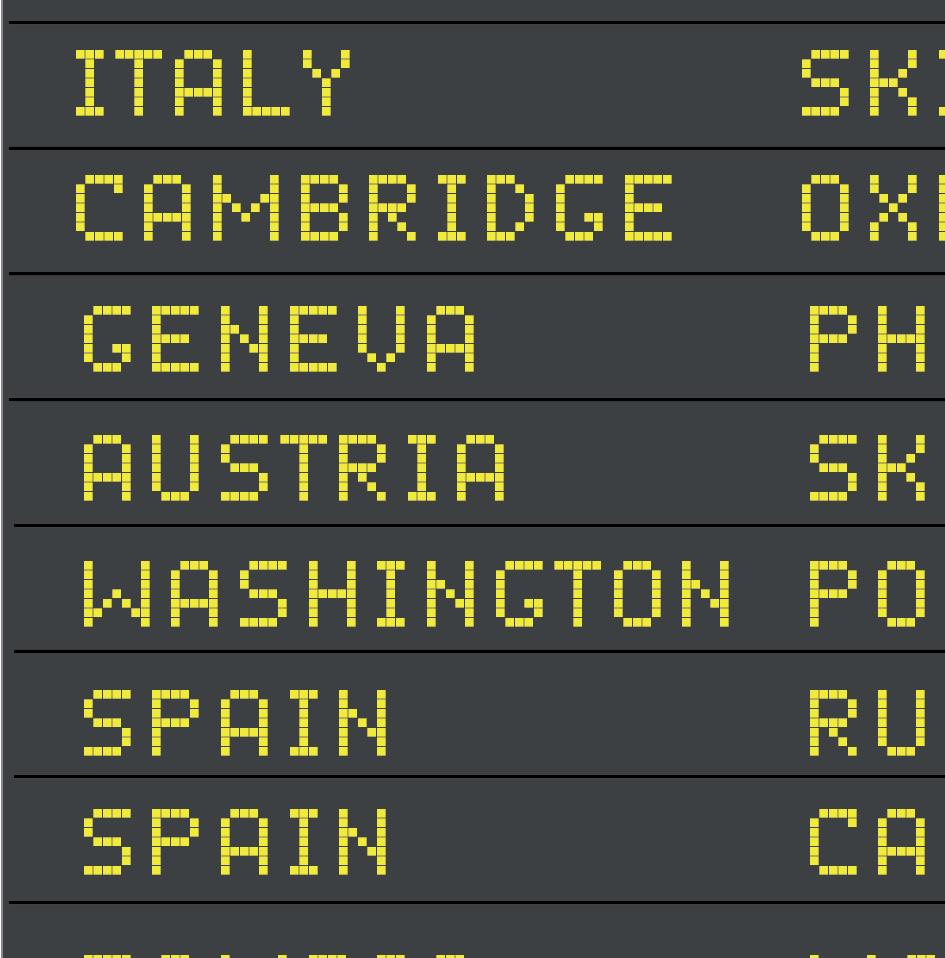

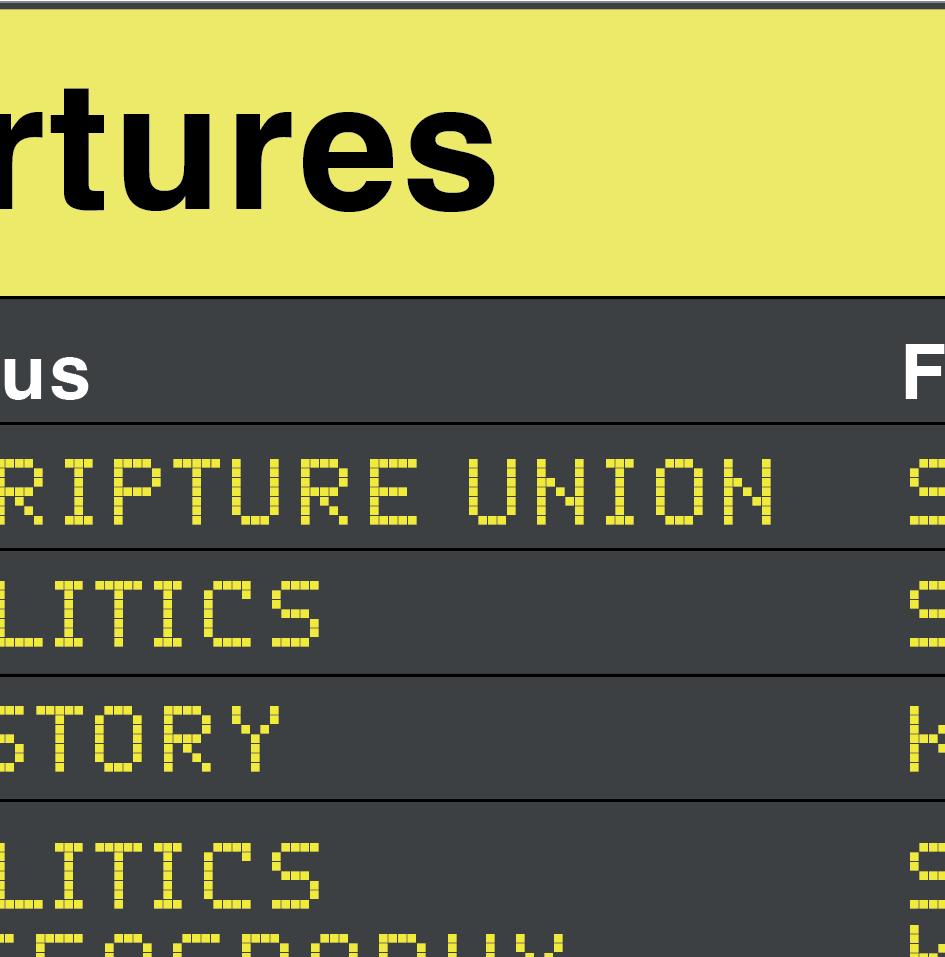

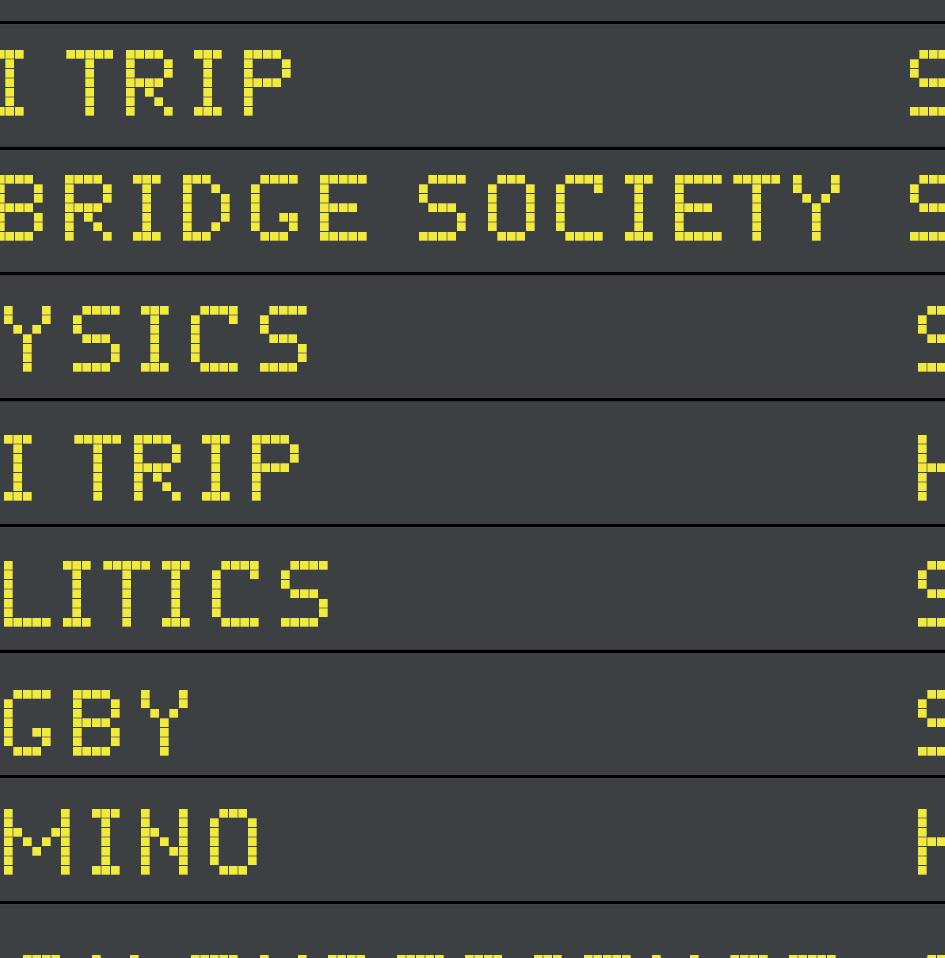




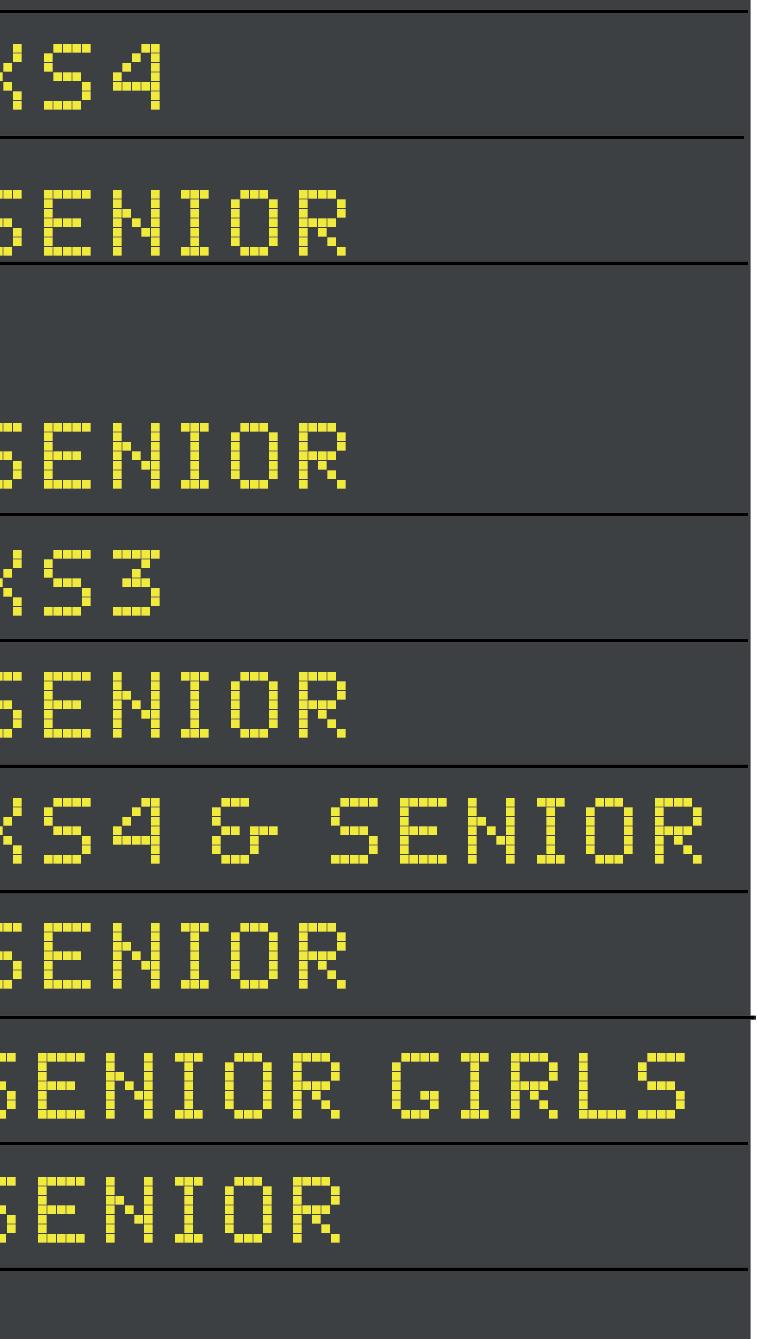

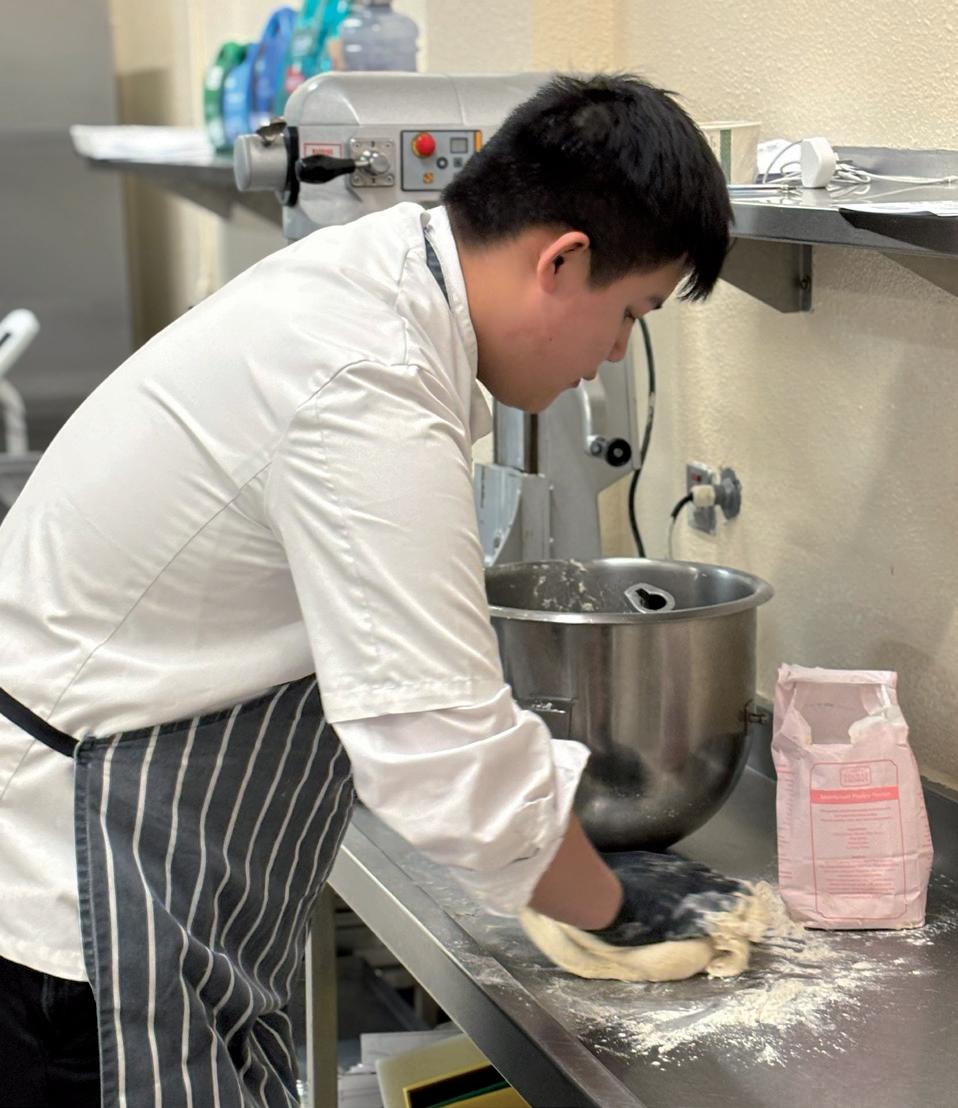
As the winter months roll in and nights get colder and darker, we all know the comfort of settling down in the evening with the fire on and the next round of MasterChef on the TV. Miss Windrum, the Subject Leader for HE at BRA, is no stranger to watching the show and so it is no surprise that her HE departmental outreach programme recently took on a MasterChef feel. A competition was launched to find the next BRA culinary champion and the prize was nothing short of having the winning dish scaled up and served as part of the wide range of dishes on offer in the school canteen.
After much planning and preparing, tasting and tweaking, the recipes were ready and the tables were set. Each of the entrants cooked their creations and the judges, who included Miss Windrum and expert staff from the canteen, got tasting. Boye Li battled over forty recipes in the qualifying round, going on to defeat four other pupils in the final cook-off, where he claimed first place, along with the title of BRA MasterChef champion.
Now, the winner Boye Li, has been teaching the canteen staff how to prepare his winning dish, Jiăo Zī, so his friends and peers could have the chance to experience the amazing flavours in his winning recipe. Miss Windrum described the dumplings as “a flavour explosion in every bite”.
Well done to Boye and the four other finalists (Daire Burns, Elizabeth Clawson, Cara Magee and Noah Braithwaite) on their amazing recipe ideas and outstanding practical skills.

1 cup chopped Chinese leaf
1 cup chopped spring onion
1 cup pork mince
1 cup soy sauce
Pinch of salt and pepper
2 cups water
1 cup cooking oil
50 grams plain flour
500ml water
For the filling:
Step 1: Place a medium sized pan on high heat, add the pork mince, stir and flip until pork is brown, remove from the pan and set to one side.
Step 2: In a large bowl add the Chinese leaf, spring onion, cooked pork mince, soy sauce, salt and pepper and mix thoroughly.
For the wrapping
Step 1: Place the flour in a mixing bowl and add ¼ cup of water. Knead the dough until it is consistent, adding more water if necessary to bind the dough.
Step 2: Separate the dough into balls, then flatten with a rolling pin.
Preparation
Step 1: Add a spoonful of filling into the middle of the dough.
Step 2: Fold the bottom side of the dough up.
Step 3: Pinch the edges.
Cooking
Step 1: Pour 500ml of water in a medium sized pot.
Step 2: Once water is boiling place in your Jiăo Zī and wait 5-10 minutesadd cold water occasionally to prevent bubbling.
Step 3: Take out and serve with soy sauce.
Tom McKibbin: Northern Ireland golfer wins first DP World Tour title at European Open


Head Girl hopes for top class Commonwealth Run
Christine McMahon, gets a rousing send off from her classmates as she sets off for India to participate in the Commonwealth Games
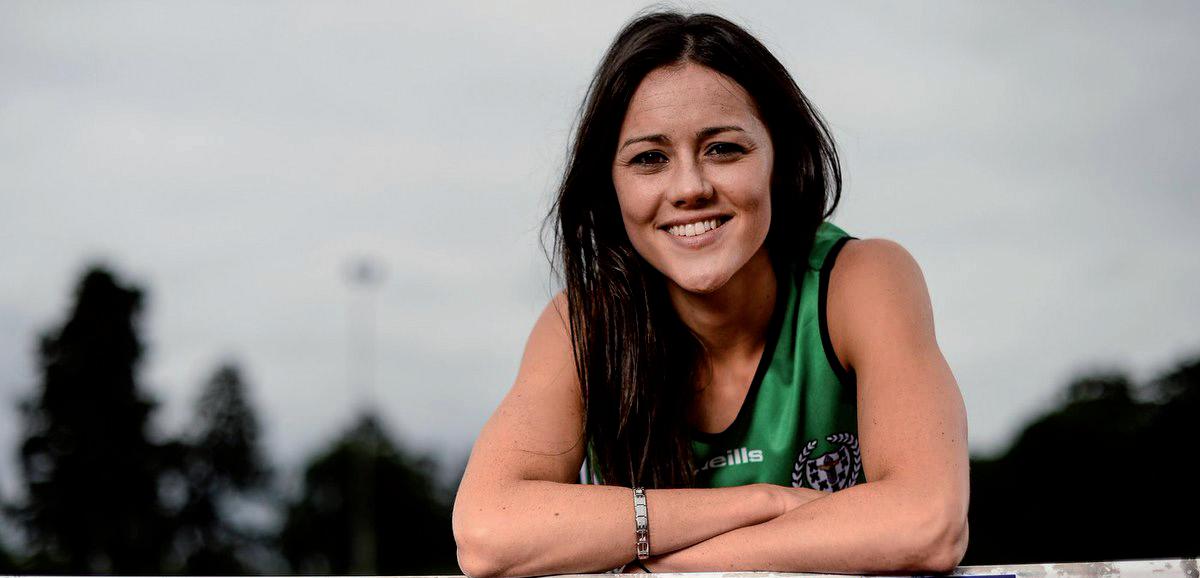

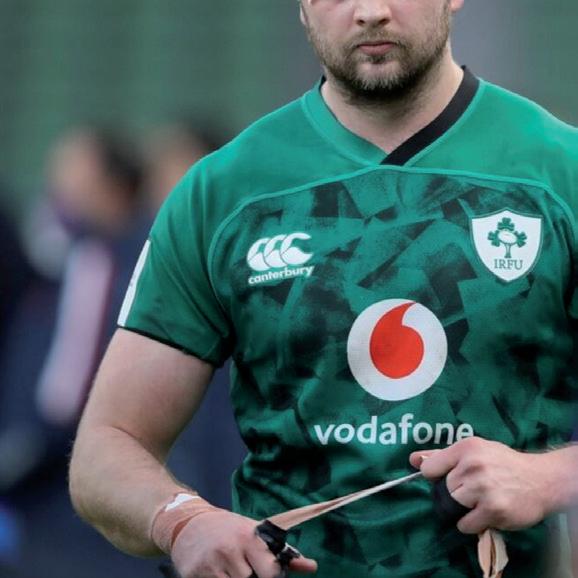



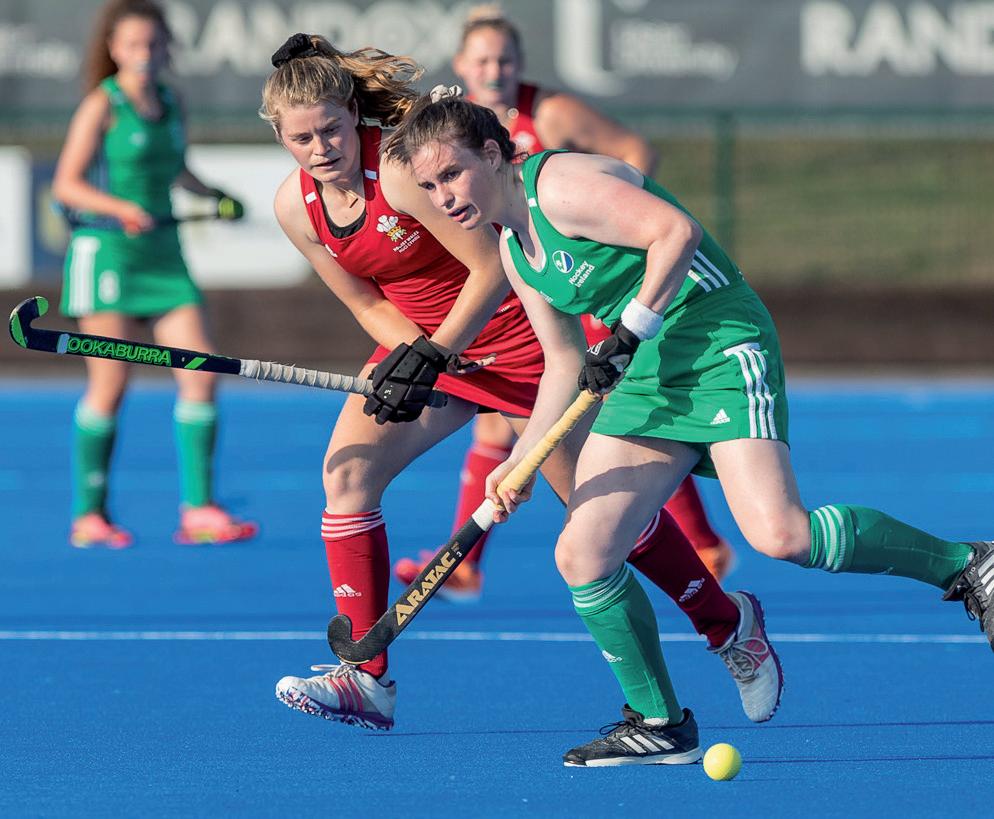


Tom Stewart handed full Ireland debut at Hooker for final warm-up against Samoa




In a world where personal development and teamwork are more essential than ever, Belfast Royal Academy has stepped up to the plate, offering an extensive array of sporting opportunities for pupils at both the Cliftonville Road site and the Roughfort Playing Fields.
Whether your passion lies in swimming, netball, rugby, or cricket, BRA is prepared to foster both sporting excellence and lifelong friendships.
With a deep commitment to sports, BRA encourages its pupils to explore their potential across various sporting disciplines. Each pupil is motivated to not only compete at the school level but also to strive for excellence, with opportunities to represent the Academy in district, Ulster, and even national and international competitions. “We believe that every pupil should have the chance to excel and find their place in the world of sports,” said Mr McGonigle, the Head of PE at BRA. “Whether they’re playing for fun or aiming for the top, we’re here to guide them.”
BRA’s state-of-the-art facilities play a crucial role in nurturing young talent. The Academy boasts a sports hall equipped with indoor cricket nets, a
newly refurbished strength and conditioning suite, a 30m indoor swimming pool, and a gym featuring spin bikes. Outdoors, pupils can take advantage of six rugby pitches—including a floodlit option—an Astro-turf hockey pitch, two cricket squares, outdoor nets, and an athletics track. These facilities not only cater for competitive sports but also promote physical fitness and well-being among all pupils.
Physical Education (PE) and games are not merely extracurricular activities at BRA; they serve as vital components of holistic education. They contribute significantly to the personal and social development of pupils, instilling values of discipline, resilience, and teamwork. “Sports teach invaluable life lessons. They help pupils grow not only as athletes but as individuals—learning to work together, handle setbacks, and celebrate victories,” noted Miss Brady, Head of Girls’ PE and LSC at the Academy.
The Academy’s commitment to sports extends beyond participating in team events; it aims to instil a love for physical activity that lasts a lifetime. “We hope that every pupil walks away with an activity they will cherish well into adulthood,” Miss Brady added.
Critics may argue that the emphasis on sports could detract from academic pursuits; however, BRA finds a harmonious balance. By promoting sports alongside academics, the Academy enhances pupils’ overall well-being and prepares them for future challenges, both in their studies and in life.
As BRA continues to expand its sporting programmes, the message is clear: every pupil has the opportunity to shine, whether on the field, in the pool, or in the gym. The Academy stands committed to nurturing the next generation of sports men and women, instilling values that extend far beyond the playing fields, and cultivating a community where teamwork and friendship thrive.
At Belfast Royal Academy, the journey to excellence in sports mirrors that of personal growth, forging connections that last a lifetime. With world-class facilities and a dedicated staff, BRA is not just about competition; it’s about building character, resilience, and a love for sports that pupils can carry throughout their lives.
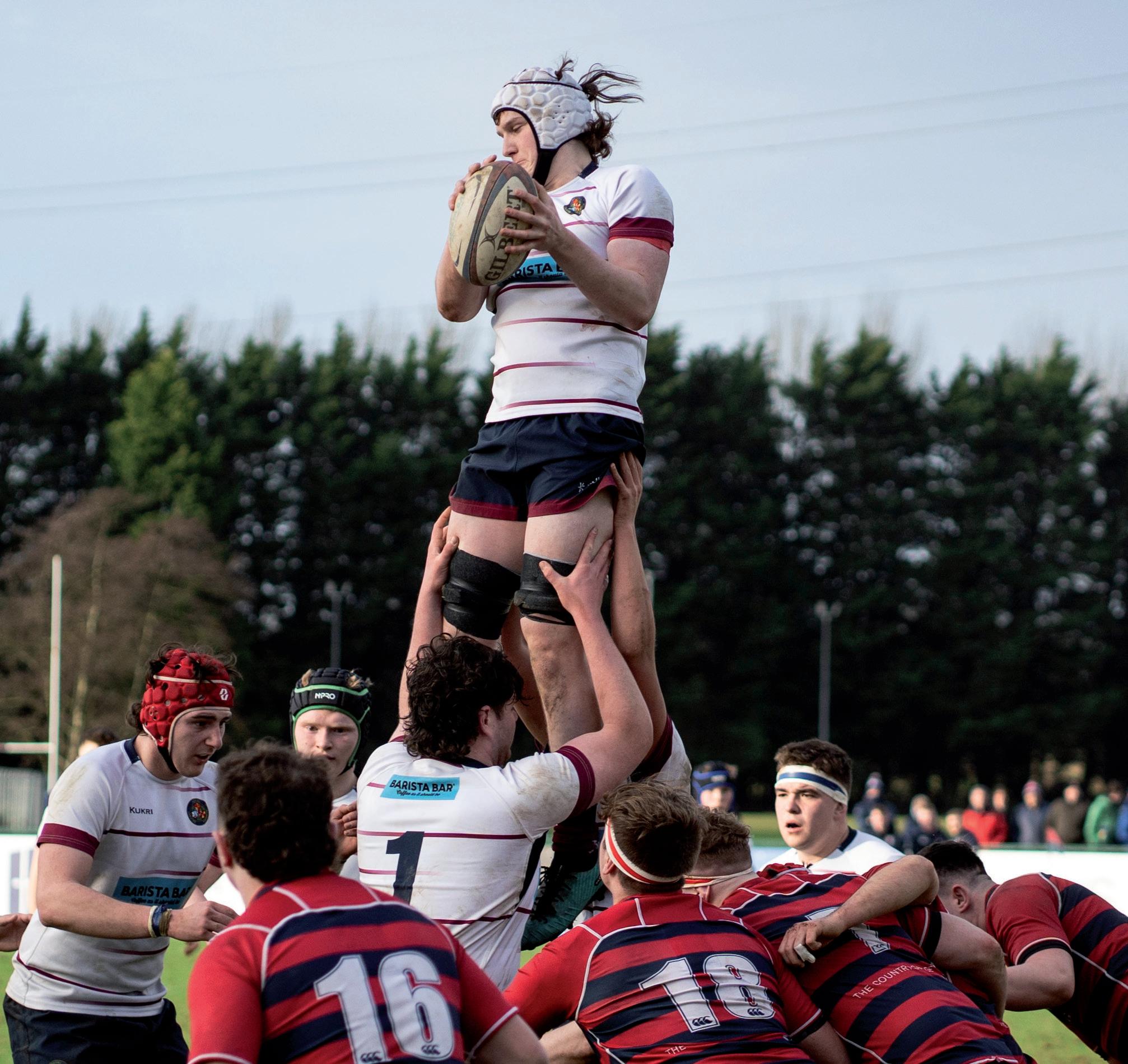

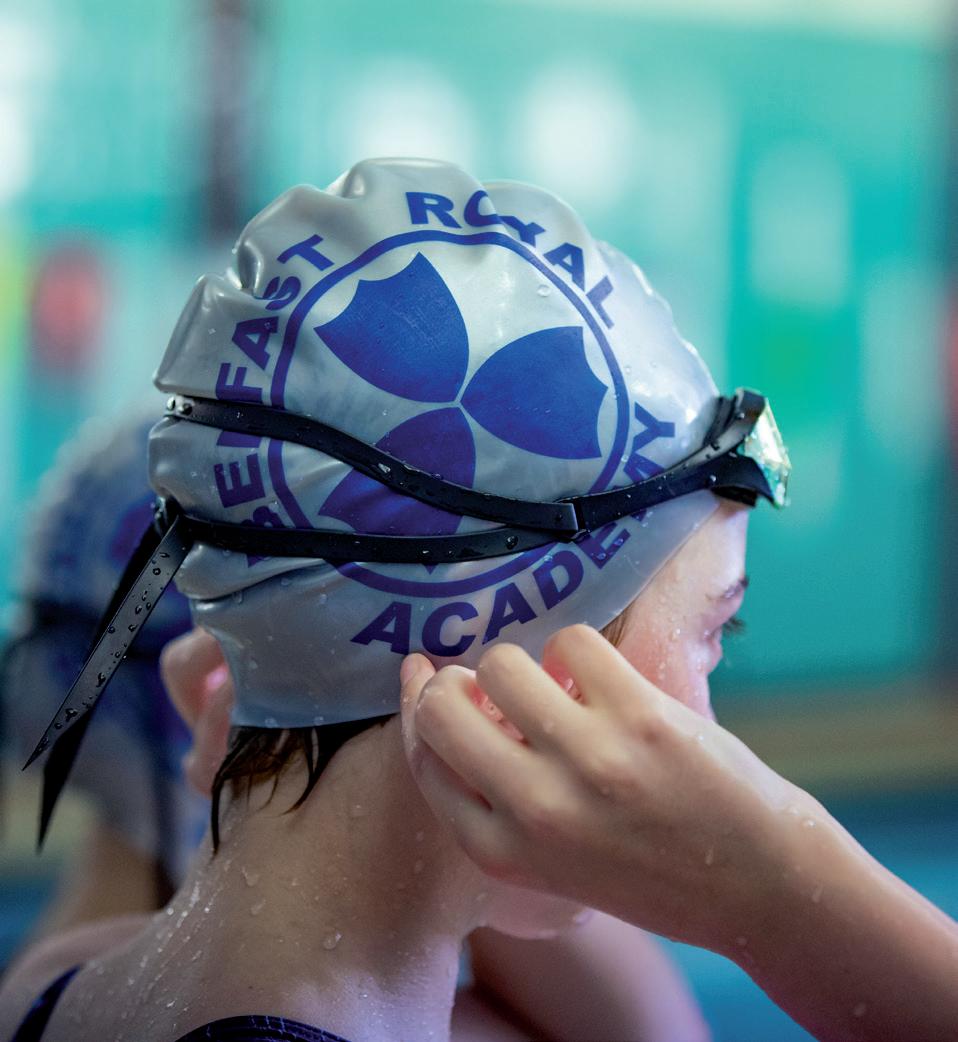

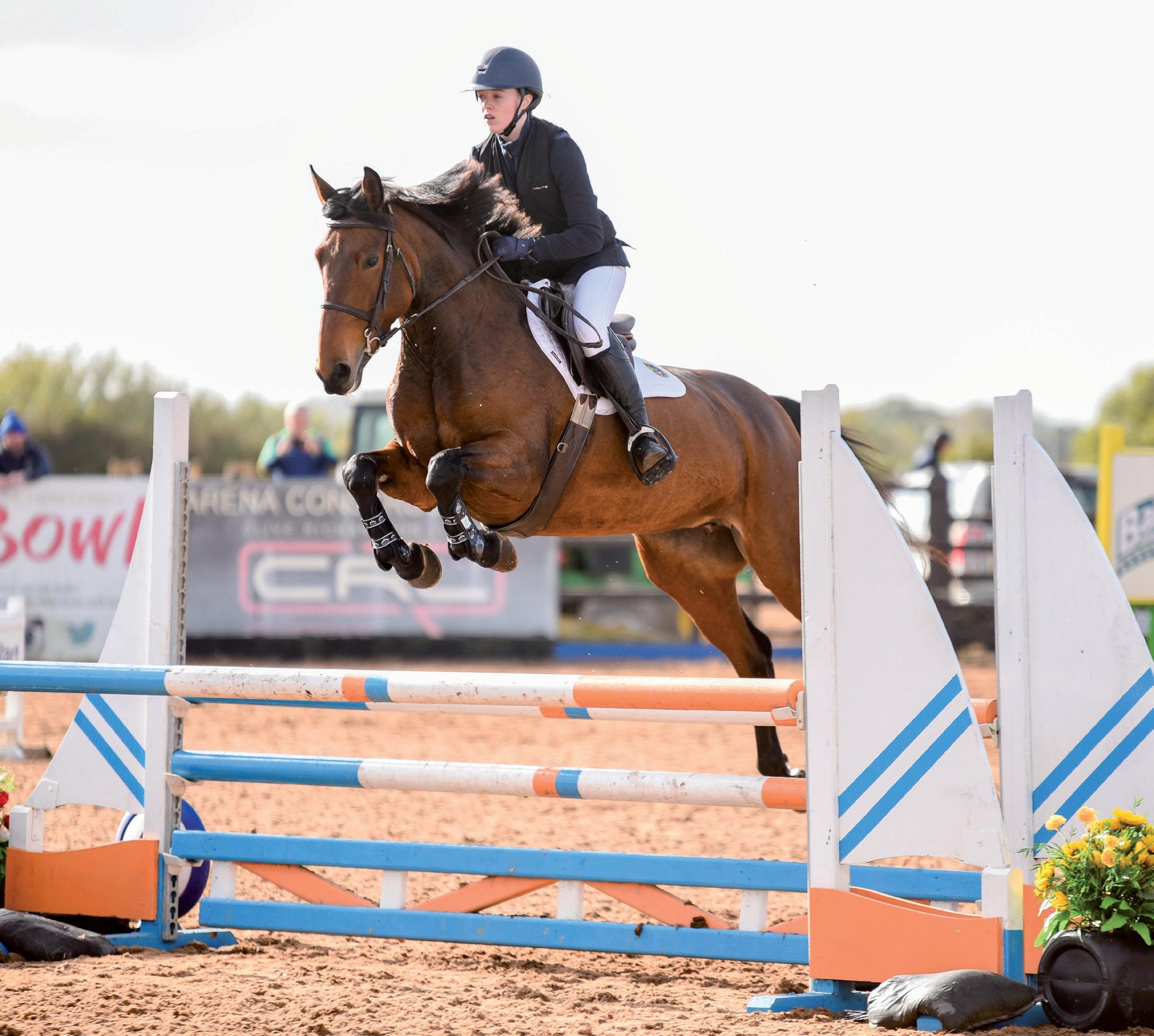



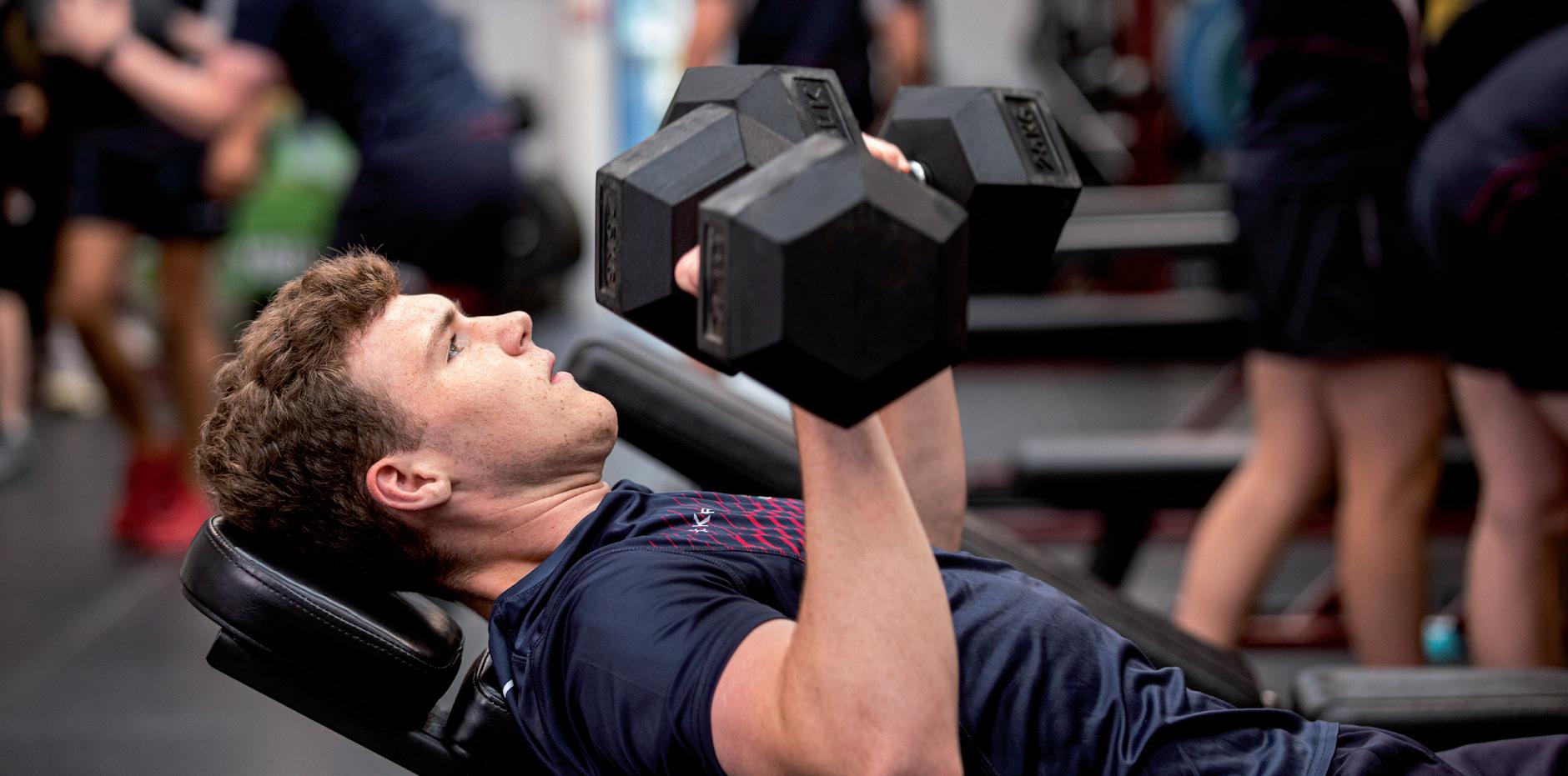
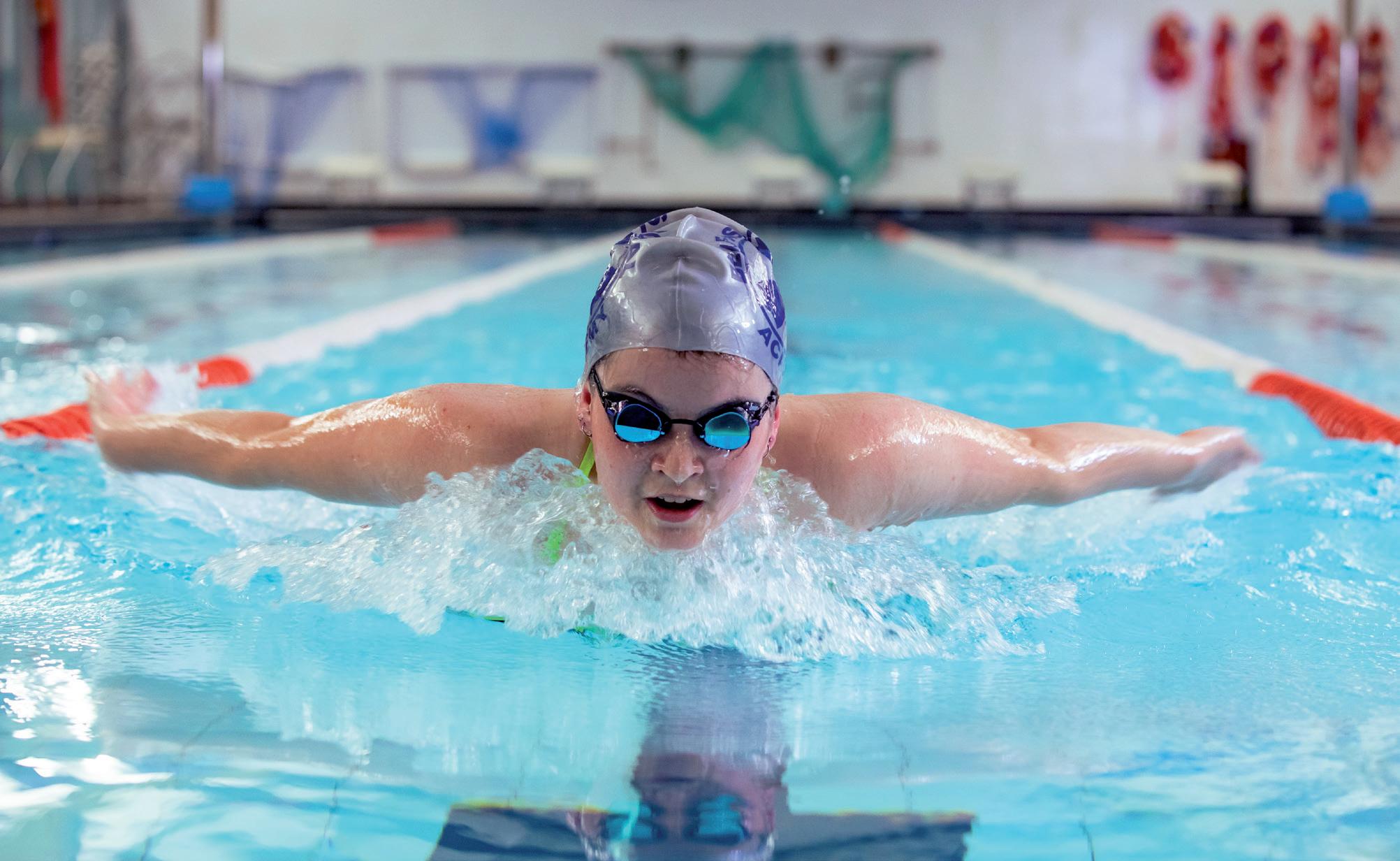

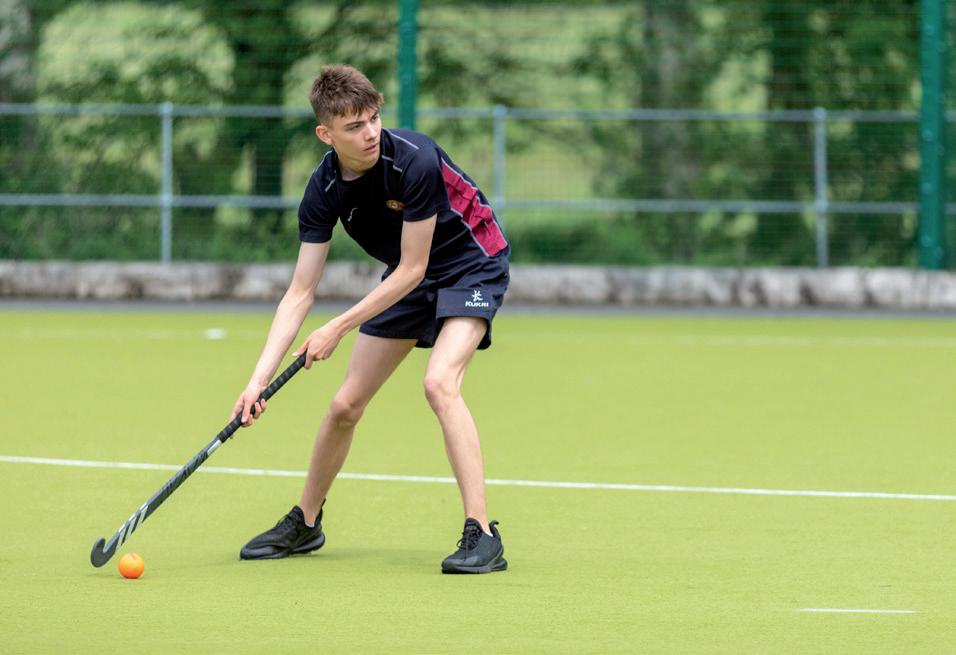


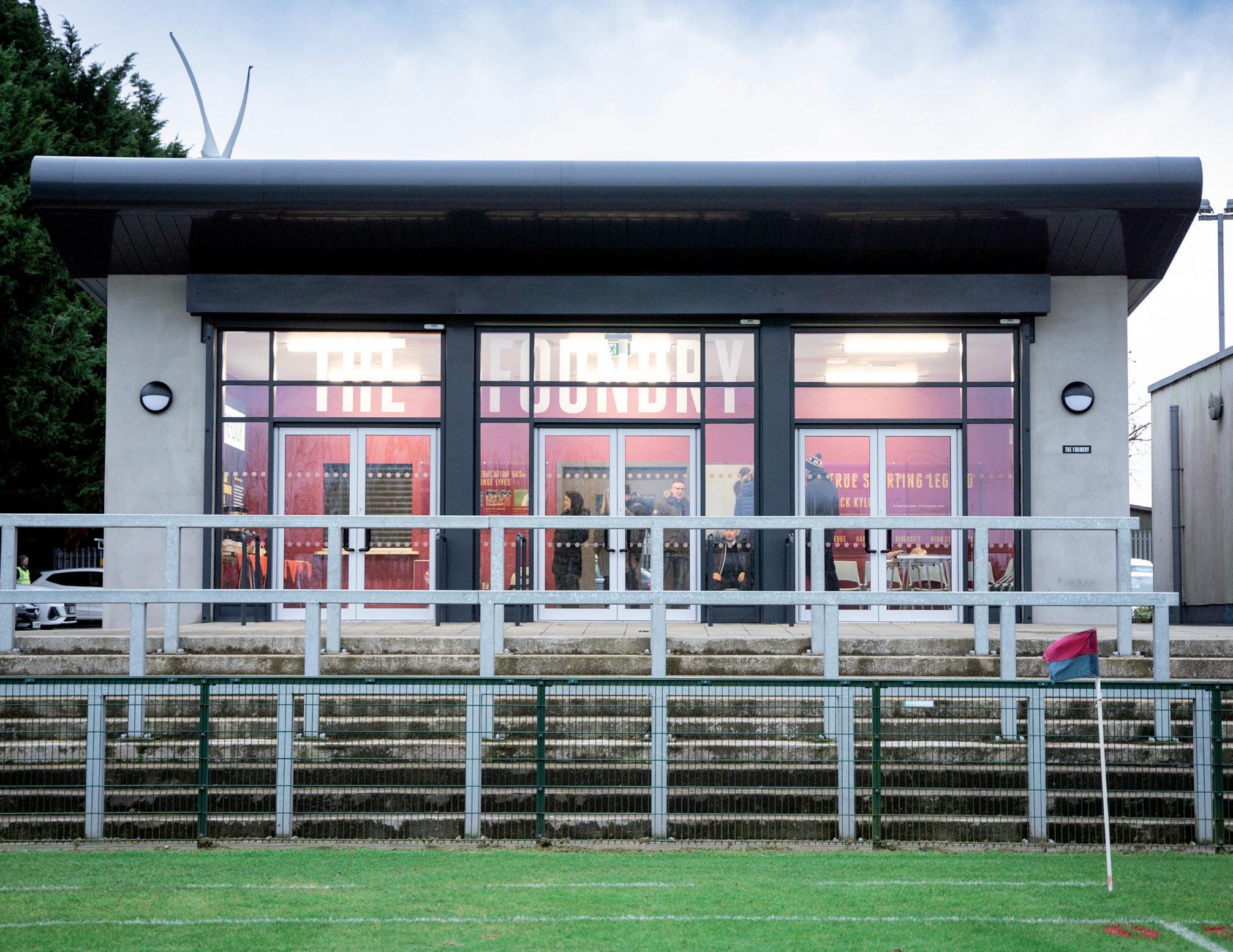
The Roughfort Centre of Sporting Excellence celebrated a landmark occasion on January 27, 2024, with the official opening of The Foundry, designed to enhance the experience of visiting teams, staff, and pupils. The event brought together around 60 invited guests, including governors, current and former staff, and notable alumni, to commemorate a significant milestone in the Academy’s commitment to sporting excellence and education.
The Foundry serves multiple purposes: a venue for hospitality during major sporting events, a teaching resource for in-depth game analysis, and a gathering space for visiting teams and distinguished guests. The Building and Estates Committee expressed their enthusiasm for the new facility, stating, “The Foundry embodies our vision of combining passion, determination, and skill. It is a place where a winning mentality can be forged, both on and off the field.”
This sentiment was echoed by the Estates Manager, describing the building as the realisation of collective efforts. “This project has truly been a collaborative journey,” she noted, thanking the architect Jason Bosket from Whittaker & Watt and contractor Hugh Griffin & Sons for their excellent work in completing the project to such a high standard.
The branding of The Foundry, conceptualized by Anthology directors Tim McVicker and Alan Beck, is rooted in the ethos of BRA. “The name reflects our commitment to excellence and the transformation
of individuals into champions,” stated the branding team during the ceremony. “We wanted a name that resonates with the values we hold dear and represents the spirit of BRA”.
Highlighting BRA’s sporting history, the ceremony remembered notable alumnus Jack Kyle, a celebrated rugby player and humanitarian. Although Kyle did not train at Roughfort, his legacy as a former Head Boy and his contributions to both sports and global welfare were honoured on a dedicated wall of fame. “Jack Kyle exemplifies the values we strive to instil in our pupils. His integrity and dedication are an inspiration to all,” remarked Mrs Woods, Principal of BRA.
The ribbon-cutting ceremony was performed by Mr Stephen Warke, a former international cricketer and current governor of the school, alongside Christine McMahon, a Commonwealth athlete. Mr Warke shared his enthusiasm for the significance of The Foundry, emphasizing its potential to elevate Roughfort’s sporting programmes.
As The Foundry officially opens its doors, the Roughfort Centre of Sporting Excellence stands poised to foster a new generation of athletes. With its innovative design, dedicated spaces for teaching, and connection to the community, The Foundry is more than just a building; it is a beacon of ambition for aspiring athletes. The Foundry marks a transformative chapter for Roughfort, blending tradition with modernity to create an environment where excellence in sport and education can thrive.
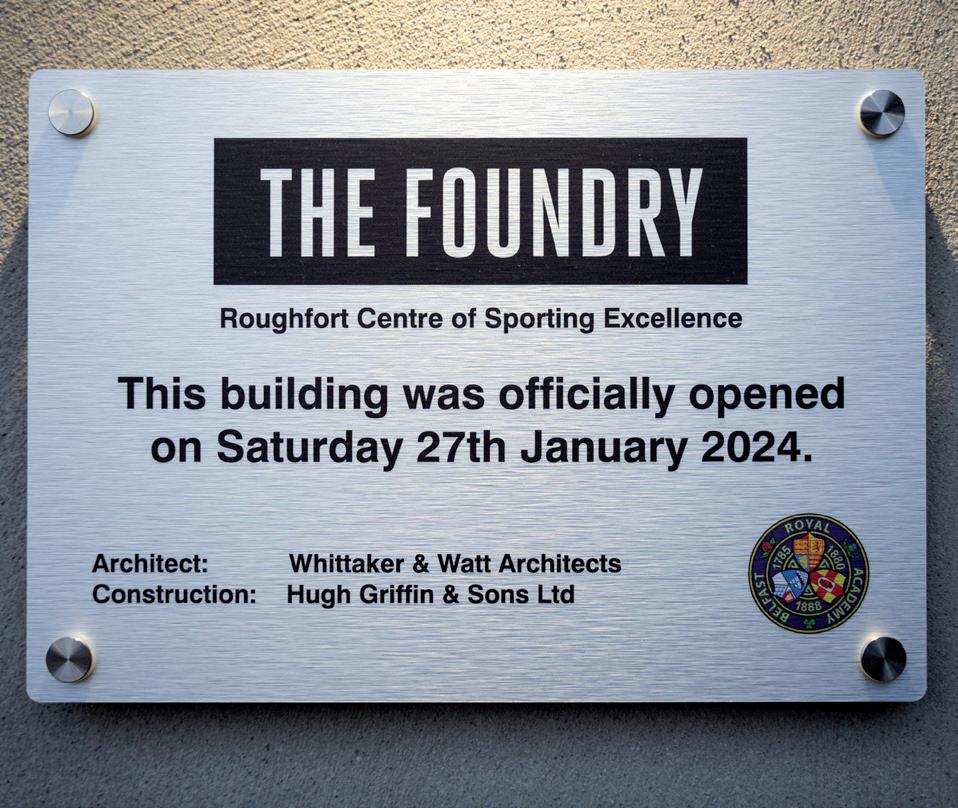
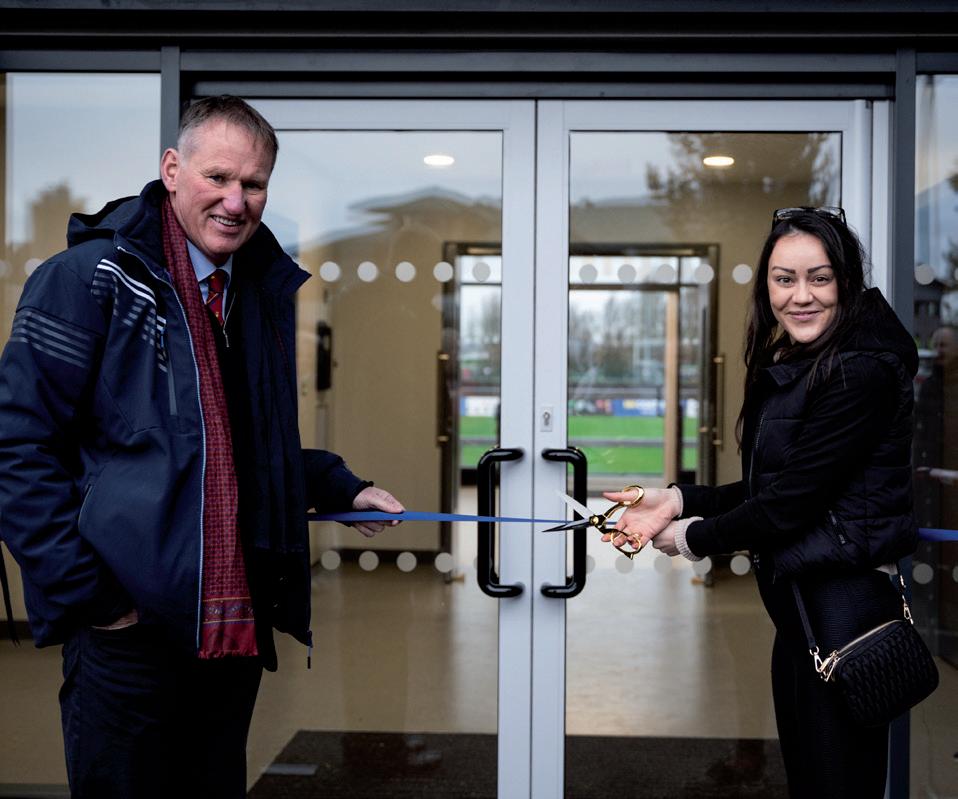


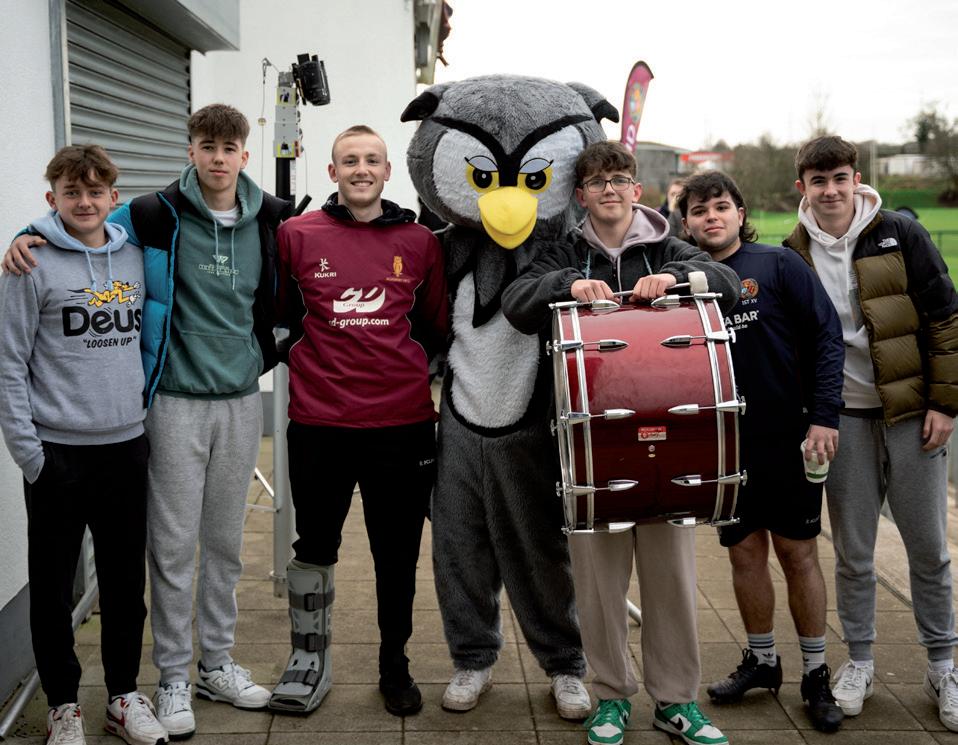
In the vibrant community of Belfast Royal Academy, the unwavering support of alumni, parents, staff, and friends has become the cornerstone of an enriching educational experience for pupils. With a legacy built on generosity, the Academy has successfully advanced numerous projects that enhance teaching, facilities, and extracurricular activities—achievements that could not have been realized without contributions beyond public funding.
Over the years, initiatives like the establishment of the Sixth Form Centre, the creation of a dedicated Music Centre, and the enhancement of the Roughfort sporting complex have set new standards for education and personal development. Notably, international trips, professional sports coaching, and the acquisition of state-of-the-art teaching tools exemplify the Academy’s commitment to providing a holistic education. Each of these endeavours relies heavily on the philanthropy of a supportive network.
“The difference made by alumni donations is palpable,” shares Principal Hilary Woods. “Every contribution, no matter the size, plays a vital role in shaping the academic and cultural experiences of our pupils. It’s about investing in the next generation and their unlimited potential.”
Looking ahead, Belfast Royal Academy has ambitious plans for future development projects. Enhancing academic programmes and cultural initiatives is essential to maintaining BRA’s reputation for excellence. “We are committed to fostering an environment where pupils thrive both inside and outside the classroom,” adds Mr Eric Porter, Warden of the Board of Governors, “However, we frequently see how these projects benefit from the sustained support from our community of alumni.”
While public funding provides a foundational framework, it often falls short in covering the costs of innovative programmes and facilities that elevate pupil experiences. Alumni support fills this gap, ensuring that the next wave of pupils can benefit from the same enriching environment experienced by their predecessors.
With the establishment of the 1785 Foundation, Belfast Royal Academy welcomes gifts of any size, encouraging all alumni to consider becoming longterm supporters. “Joining the Foundation is not just about financial contributions; it’s about being part
of a community that believes in the power of education in its fullest sense,” said Chairperson of the Foundation, Martin Blake; “When you give, you are helping to create holistic opportunities that could change a child’s life forever.”
As alumni reflect on their experiences and the impact of their education at Belfast Royal Academy, they are invited to help shape the future for current and future pupils. Your support can create transformative experiences that resonate for years to come.


To make a difference today, consider donating or joining the 1785 Foundation at belfastroyalacademy.com/support-us
Together, let’s empower the next generation of learners.


30 donors giving £10 a month with Gift Aid over 3 years will raise

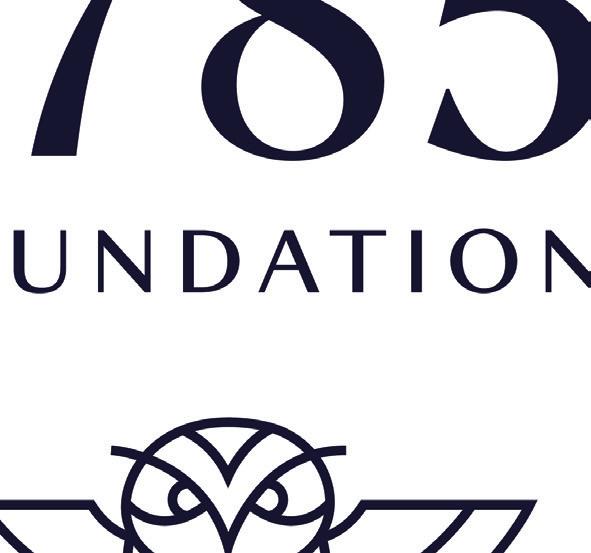



£13,500 which could fund 200 hours of pupil counselling a year When you give, you are helping to create holistic opportunities that could change a child’s life forever.



